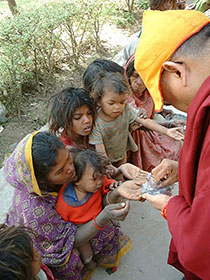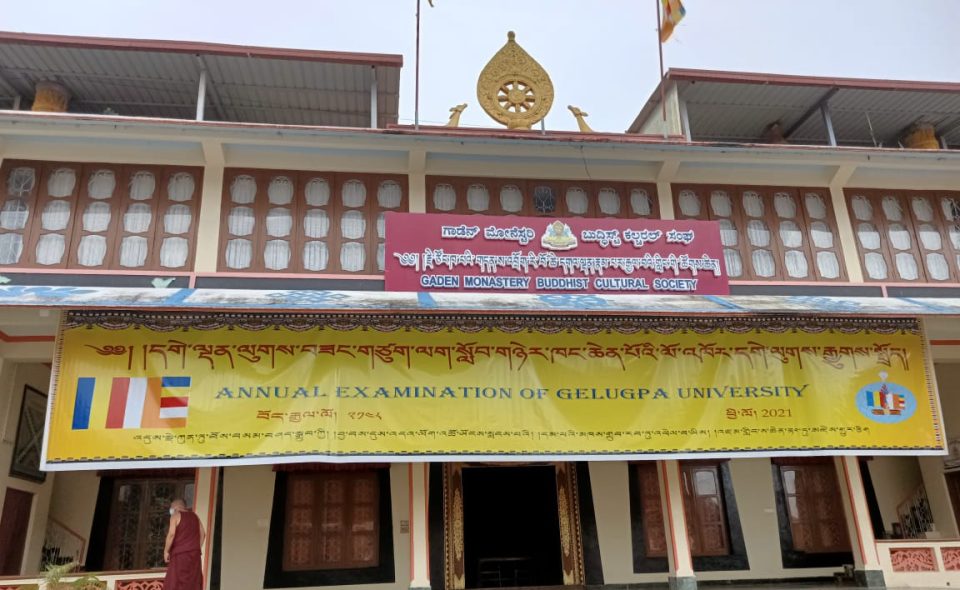- Home
- FPMT Homepage
Foundation for the Preservation of the Mahayana Tradition
The FPMT is an organization devoted to preserving and spreading Mahayana Buddhism worldwide by creating opportunities to listen, reflect, meditate, practice and actualize the unmistaken teachings of the Buddha and based on that experience spreading the Dharma to sentient beings. We provide integrated education through which people’s minds and hearts can be transformed into their highest potential for the benefit of others, inspired by an attitude of universal responsibility and service. We are committed to creating harmonious environments and helping all beings develop their full potential of infinite wisdom and compassion. Our organization is based on the Buddhist tradition of Lama Tsongkhapa of Tibet as taught to us by our founders Lama Thubten Yeshe and Lama Thubten Zopa Rinpoche.
- Willkommen
Die Stiftung zur Erhaltung der Mahayana Tradition (FPMT) ist eine Organisation, die sich weltweit für die Erhaltung und Verbreitung des Mahayana-Buddhismus einsetzt, indem sie Möglichkeiten schafft, den makellosen Lehren des Buddha zuzuhören, über sie zur reflektieren und zu meditieren und auf der Grundlage dieser Erfahrung das Dharma unter den Lebewesen zu verbreiten.
Wir bieten integrierte Schulungswege an, durch denen der Geist und das Herz der Menschen in ihr höchstes Potential verwandelt werden zum Wohl der anderen – inspiriert durch eine Haltung der universellen Verantwortung und dem Wunsch zu dienen. Wir haben uns verpflichtet, harmonische Umgebungen zu schaffen und allen Wesen zu helfen, ihr volles Potenzial unendlicher Weisheit und grenzenlosen Mitgefühls zu verwirklichen.
Unsere Organisation basiert auf der buddhistischen Tradition von Lama Tsongkhapa von Tibet, so wie sie uns von unseren Gründern Lama Thubten Yeshe und Lama Thubten Zopa Rinpoche gelehrt wird.
- Bienvenidos
La Fundación para la preservación de la tradición Mahayana (FPMT) es una organización que se dedica a preservar y difundir el budismo Mahayana en todo el mundo, creando oportunidades para escuchar, reflexionar, meditar, practicar y actualizar las enseñanzas inconfundibles de Buda y en base a esa experiencia difundir el Dharma a los seres.
Proporcionamos una educación integrada a través de la cual las mentes y los corazones de las personas se pueden transformar en su mayor potencial para el beneficio de los demás, inspirados por una actitud de responsabilidad y servicio universales. Estamos comprometidos a crear ambientes armoniosos y ayudar a todos los seres a desarrollar todo su potencial de infinita sabiduría y compasión.
Nuestra organización se basa en la tradición budista de Lama Tsongkhapa del Tíbet como nos lo enseñaron nuestros fundadores Lama Thubten Yeshe y Lama Zopa Rinpoche.
A continuación puede ver una lista de los centros y sus páginas web en su lengua preferida.
- Bienvenue
L’organisation de la FPMT a pour vocation la préservation et la diffusion du bouddhisme du mahayana dans le monde entier. Elle offre l’opportunité d’écouter, de réfléchir, de méditer, de pratiquer et de réaliser les enseignements excellents du Bouddha, pour ensuite transmettre le Dharma à tous les êtres. Nous proposons une formation intégrée grâce à laquelle le cœur et l’esprit de chacun peuvent accomplir leur potentiel le plus élevé pour le bien d’autrui, inspirés par le sens du service et une responsabilité universelle. Nous nous engageons à créer un environnement harmonieux et à aider tous les êtres à épanouir leur potentiel illimité de compassion et de sagesse. Notre organisation s’appuie sur la tradition guéloukpa de Lama Tsongkhapa du Tibet, telle qu’elle a été enseignée par nos fondateurs Lama Thoubtèn Yéshé et Lama Zopa Rinpoché.
Visitez le site de notre Editions Mahayana pour les traductions, conseils et nouvelles du Bureau international en français.
Voici une liste de centres et de leurs sites dans votre langue préférée
- Benvenuto
L’FPMT è un organizzazione il cui scopo è preservare e diffondere il Buddhismo Mahayana nel mondo, creando occasioni di ascolto, riflessione, meditazione e pratica dei perfetti insegnamenti del Buddha, al fine di attualizzare e diffondere il Dharma fra tutti gli esseri senzienti.
Offriamo un’educazione integrata, che può trasformare la mente e i cuori delle persone nel loro massimo potenziale, per il beneficio di tutti gli esseri, ispirati da un’attitudine di responsabilità universale e di servizio.
Il nostro obiettivo è quello di creare contesti armoniosi e aiutare tutti gli esseri a sviluppare in modo completo le proprie potenzialità di infinita saggezza e compassione.
La nostra organizzazione si basa sulla tradizione buddhista di Lama Tsongkhapa del Tibet, così come ci è stata insegnata dai nostri fondatori Lama Thubten Yeshe e Lama Zopa Rinpoche.
Di seguito potete trovare un elenco dei centri e dei loro siti nella lingua da voi prescelta.
- 欢迎 / 歡迎
简体中文
“护持大乘法脉基金会”( 英文简称:FPMT。全名:Foundation for the Preservation of the Mahayana Tradition) 是一个致力于护持和弘扬大乘佛法的国际佛教组织。我们提供听闻,思维,禅修,修行和实证佛陀无误教法的机会,以便让一切众生都能够享受佛法的指引和滋润。
我们全力创造和谐融洽的环境, 为人们提供解行并重的完整佛法教育,以便启发内在的环宇悲心及责任心,并开发内心所蕴藏的巨大潜能 — 无限的智慧与悲心 — 以便利益和服务一切有情。
FPMT的创办人是图腾耶喜喇嘛和喇嘛梭巴仁波切。我们所修习的是由两位上师所教导的,西藏喀巴大师的佛法传承。
繁體中文
護持大乘法脈基金會”( 英文簡稱:FPMT。全名:Found
ation for the Preservation of the Mahayana Tradition ) 是一個致力於護持和弘揚大乘佛法的國際佛教組織。我們提供聽聞, 思維,禪修,修行和實證佛陀無誤教法的機會,以便讓一切眾生都能 夠享受佛法的指引和滋潤。 我們全力創造和諧融洽的環境,
為人們提供解行並重的完整佛法教育,以便啟發內在的環宇悲心及責 任心,並開發內心所蘊藏的巨大潛能 — 無限的智慧與悲心 – – 以便利益和服務一切有情。 FPMT的創辦人是圖騰耶喜喇嘛和喇嘛梭巴仁波切。
我們所修習的是由兩位上師所教導的,西藏喀巴大師的佛法傳承。 察看道场信息:
- FPMT Homepage
- News/Media
-
- Study & Practice
-
-
- About FPMT Education Services
- Latest News
- Programs
- New to Buddhism?
- Buddhist Mind Science: Activating Your Potential
- Heart Advice for Death and Dying
- Discovering Buddhism
- Living in the Path
- Exploring Buddhism
- FPMT Basic Program
- FPMT Masters Program
- FPMT In-Depth Meditation Training
- Maitripa College
- Lotsawa Rinchen Zangpo Translator Program
- Universal Education for Compassion & Wisdom
- Online Learning Center
-
- Prayers & Practice Materials
- Overview of Prayers & Practices
- Full Catalogue of Prayers & Practice Materials
- Explore Popular Topics
- Benefiting Animals
- Chenrezig Resources
- Death & Dying Resources
- Lama Chopa (Guru Puja)
- Lama Zopa Rinpoche: Compendium of Precious Instructions
- Lama Zopa Rinpoche: Life Practice Advice
- Lama Zopa Rinpoche Practice Series
- Lamrim Resources
- Mantras
- Prayer Book Updates
- Purification Practices
- Sutras
- Thought Transformation (Lojong)
- Audio Materials
- Dharma Dates - Tibetan Calendar
- Translation Services
- Publishing Services
- Ways to Offer Support
- Prayers & Practice Materials
-
- Teachings and Advice
- Find Teachings and Advice
- Lama Zopa Rinpoche Advice Page
- Lama Zopa Rinpoche: Compendium of Precious Instructions
- Lama Zopa Rinpoche Video Teachings
- ༧སྐྱབས་རྗེ་བཟོད་པ་རིན་པོ་ཆེ་མཆོག་ནས་སྩལ་བའི་བཀའ་སློབ་བརྙན་འཕྲིན།
- Podcasts
- Lama Yeshe Wisdom Archive
- Buddhism FAQ
- Dharma for Young People
- Resources on Holy Objects
- Teachings and Advice
-
-
*If a menu item has a submenu clicking once will expand the menu clicking twice will open the page.
-
-
- Centers
-
- Teachers
-
- Projects
-
-
-
-
*If a menu item has a submenu clicking once will expand the menu clicking twice will open the page.
-
-
- FPMT
-
-
-
-
-
Over and over again our experiences prove that it is our mental outlook that is fundamentally responsible for whether we are successful or unsuccessful, healthy or ill, attractive or ugly, happy or depressed.
Lama Thubten Yeshe
-
-
-
- Shop
-
-
-
The Foundation Store is FPMT’s online shop and features a vast selection of Buddhist study and practice materials written or recommended by our lineage gurus. These items include homestudy programs, prayers and practices in PDF or eBook format, materials for children, and other resources to support practitioners.
Items displayed in the shop are made available for Dharma practice and educational purposes, and never for the purpose of profiting from their sale. Please read FPMT Foundation Store Policy Regarding Dharma Items for more information.
-
-
Projects
8
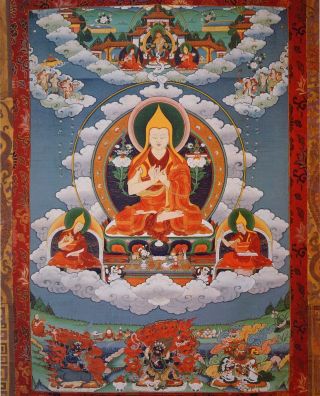
Lama Tsongkhapa (1357-1419).
Lama Tsongkhapa (1357-1419) was a Tibetan Buddhist master whose studies and meditations in all the major schools of Tibetan Buddhism resulted in the founding of the Gelugpa lineage. The Lama Tsongkhapa Teachers Fund was established by FPMT in 1997 at the request of His Holiness the Dalai Lama. The purpose of the fund is to invest in the preservation of the Gelugpa School of Tibetan Buddhism by supporting the teachers of tomorrow. Preserving the Mahayana tradition is the primary objective of the entire FPMT organization and the Lama Tsongkhapa Teachers Fund is one substantial way to help continue this work.
Exams
Every year this fund offers a grant for for daily food and travel expenses of the annual Gelug Exam. This year 1157 monks from eight monasteries are participating. The geshes and monks taking these exams are some of the top scholars coming from the main monasteries and will become future teachers, benefiting so many. This year, due to pandemic restrictions, the monks from Sera and Tashi Lhunpo monasteries participated at Sera Monastery in Bylakuppe, and the monasteries from the settlement in Mundgod participated at their respective monasteries. The cost of supporting the exams in 2021 was US$7,200.
Also a grant for US$4,945 was offered to Sera Je Monastery for 260 monks who passed an annual Special Memorization Exam. Each of these monks received a new set of robes and a cash offering for memorizing as follows:
- 78 monks memorized Commentary of Clear Meaning
- 113 monks memorized Explanation of the Provisional and True Meaning
- 50 monks memorized Bodhisattvacaryavatara (Guide to the Bodhisattva’s Way of Life)
- 13 monks memorized the first chapter of General Meaning of Paramita
- 2 monks memorized General Meaning (of the) Middle Way
- 1 monks memorized Six Logical Scriptures of the Madyamika
- 2 monk memorized Five Treatises of Maitreya
- 1 monk memorized the Root Text of Pramanavartika
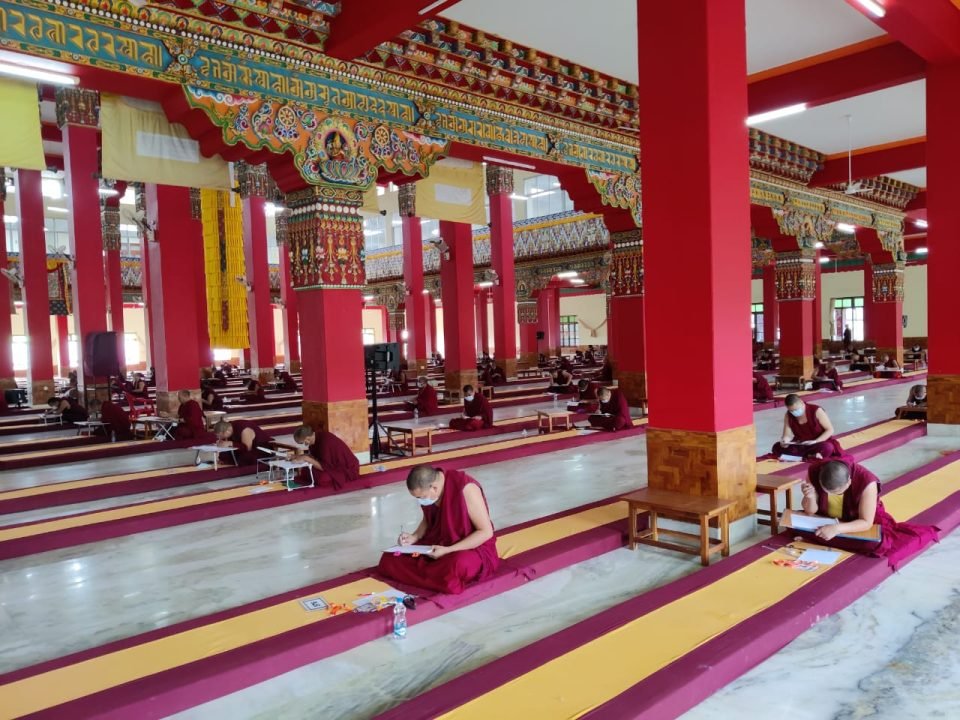
Monks studying for exam.
Investing in Teachers
A monthly offering from this fund is to provide stipends for 139 of the main teachers of the Lama Tsongkhapa tradition, including current and past abbots. This small offering of money supports these teachers’ basic needs and allows them to focus more of their time on transmitting Dharma to their students at the monasteries and strengthening their own practices. In 2021, US$11,900 was offered for this.
On advice from His Holiness the Dalai Lama, the Geluk International Foundation established a program for thirty geshe lharampas from six major monasteries and five geshemas from various nunneries to specialize in one of the five major texts. A yearly grant was previously offered from another organization within the US to help pay for these individuals to complete this extensive study for ten years. The Lama Tsongkhapa Teachers Fund agreed to take over this fund to distribute a yearly grant of US$87,500 until their studies are complete.
Investing in Buddhist Communities
The Nepal Buddhist Gelug Association was established ten years ago by the monasteries and nunneries of Nepal to preserve and develop the Tibetan Buddhist tradition in general, and the Lama Tsongkhapa lineage in particular, by elevating the standard of Buddhist studies within the monastic institutions of Nepal and the local communities. Recently a grant for US$150,000 was offered so that the following objectives could be accomplished:
- Continuation of the annual Jang Guncho Winter Debate Session
- Continuation of the Great Gelug Annual Examinations
- Conducting programs to educate local people in the Himalayan regions of Nepal on Buddhism
- Building a library to boost Buddhist education
- Supporting the construction of stupas and prayer wheels in remote villages
- Organizing offerings during the Gaden Ngacho Chenmo celebration of Tsongkhapa’s life and seminars on the Prajnaparamita Sutra
- Organizing workshops and projects to encourage dialogue between Buddhism and science
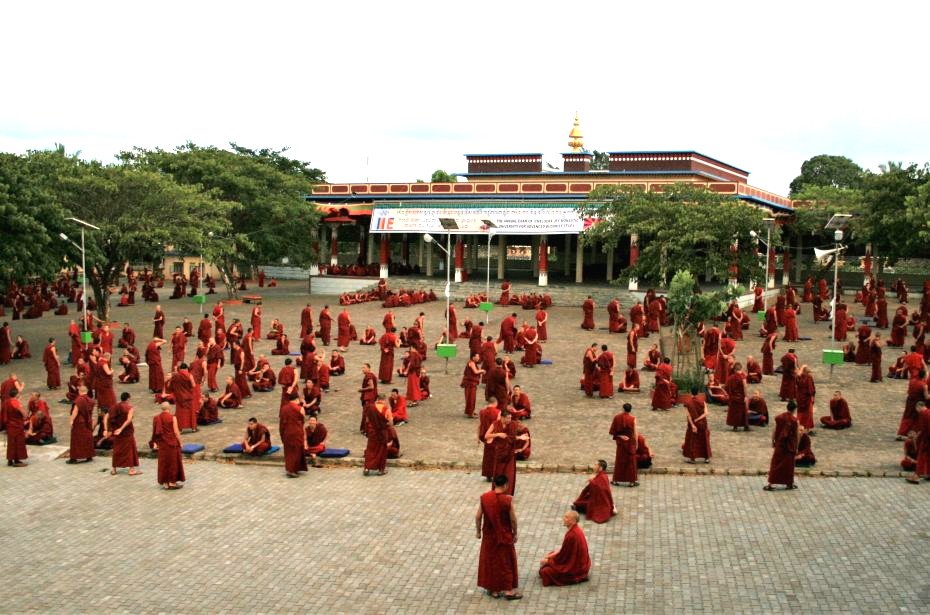
Debate in the courtyard at Sera Je Monastic University, 2009, India. Photo courtesy of Ryan Matsumoto.
An Unbroken Lineage
Please join us in rejoicing in the recent grants offered to these various activities, which help sustain Lama Tsongkhapa’s unbroken lineage in the Gelug monastic institutions, and thus, around the world as these scholars become teachers and spread the precious teachings.
“Taking responsibility for supporting these practitioners is extremely worthwhile because they are preserving and spreading the entire teaching of the Buddha.” – Lama Zopa Rinpoche
Since its inception, the Lama Tsongkhapa Teachers Fund, an extension of the Supporting Ordained Sangha Fund, has supported the preservation of the Gelug School of Tibetan Buddhism.
- Tagged: lama tsongkhapa teachers fund
15
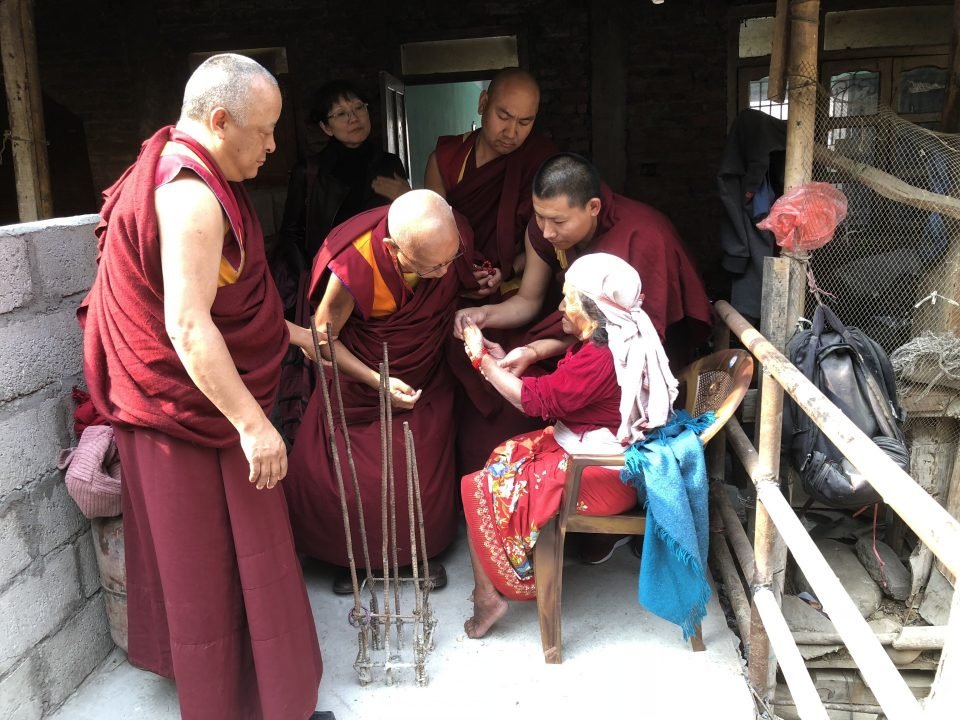
Lama Zopa Rinpoche blessing a sick elderly woman in Maratika, Nepal. Photo by Ven. Roger Kunsang.
The FPMT Social Services Fund offers grants to beneficial projects primarily in India, Nepal, and Mongolia, which are aimed at serving children, the elderly, the sick, and very poor. We offer grants for schools, hospices, health clinics, soup kitchens, and elderly homes. In addition, due to shutdowns in 2021, we also offered food and monetary assistance to thousands of families in need.
We would like to invite you to rejoice in some of the grants recently offered specifically toward medical care, living expenses, and food to those in India, Nepal and Mongolia.
Patient Care Trust, India
Patient Care Trust (PCT) is an NGO operating in India, with a large proportion of its field work being conducted in Northern India. The NGO facilitates access to quality healthcare and also organizes free medical camps with partner hospitals. The mission of this project is to provide timely access to affordable quality healthcare for the socially marginalized Tibetan Refugees.
Tibetans refugees in India are disproportionately exposed to risk due to lack of access to quality healthcare. Because of a variety of factors, many of them have a choice between costly but timely access to healthcare in private institutions, or affordable but untimely access through Indian public hospitals. As such, Tibetan refugees either give up on healthcare access, or contract high levels of debt. Most Tibetan refugees reside in rural areas of India, where local facilities are understaffed and under equipped. Additionally, reputed public government hospitals in urban areas such as Delhi have a waiting list of five to six months, but lower average costs. A number of Tibetan refugees are monks or nuns receiving very little or very low income and many have no income at all, especially the newly exiled from Tibet, who sometimes cannot speak English or Hindi. Due to these factors, the Tibetan refugees in India suffer from direct and disproportionate access to quality healthcare, particularly in the case of emergency treatment.
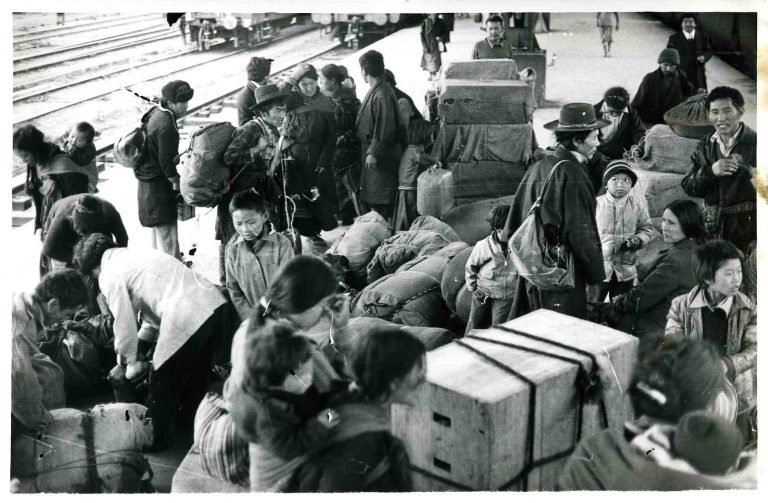
Tibetan refugees arriving in India sixty years ago. Photo courtesy of Tibet Relief Fund.
Since 2012 over 4,500 vulnerable patients have been assisted by this project. In 2021 the Social Services Fund was happy to support the important work of Patient Care Trust by covering the operational budget for an entire year with a grant of US$27,954.
Shakyamuni Buddha Clinic, India
Shakyamuni Buddha Health Clinic, a social service project of Root Institute, Bodhgaya, began in 1991 as a home for the destitute and has evolved into a diverse community health program encompassing a wide range of medical and rehabilitative services and health promotion activities.
The clinic continued to do important work in the community in 2020, some highlights are:
- The purchasing of a new Mobile Clinic vehicle that will serve hundreds of families in remote villages every week for those who cannot come to Root Institute. Through this, doctors, health educators, and physiotherapists brought much needed care to many poor families.
- The Adolescent Girls Health Training classes continued. The mission of this program is to create awareness regarding the dangers of child marriages and domestic violence, and the value of education, health, and hygiene for women for the overall wellbeing of the family.
- The teachers and students of Maitreya School, also a project of Root Institute, participated in a workshop on menstrual health and hygiene organized by Sakya Hospital. The students then continued to share this learning with students of other schools.
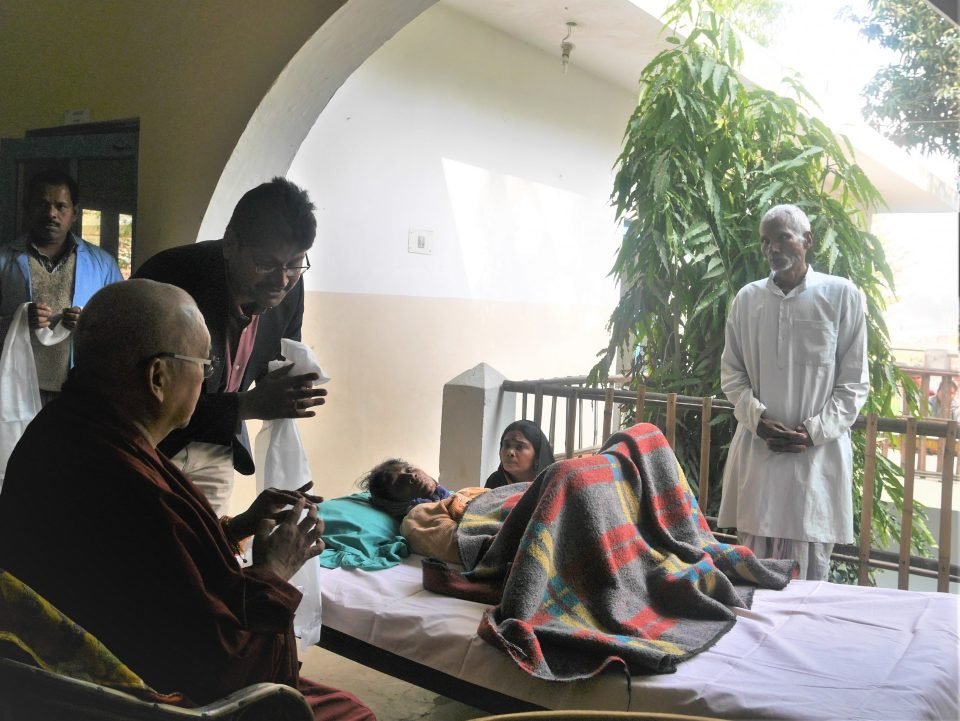
Lama Zopa Rinpoche blessing a very sick patient of Shakyamuni Health Clinic in 2017.
The clinic was required to shut it’s doors in March 2020 due to the lockdown declared by the government of India. The doctors however, continued to help patients in their personal capacities. They also distributed medicine and helped the community in whatever way they could. In February 2021, the clinic reopened with all required protocols.
The annual cost of operations for the clinic is US$30,292 and in 2021 we were very happy, through the Social Services Fund, to offer US$14,700 toward these operating expenses.
The Social Services Fund has been providing annual grants to the incredible work of Shakyamuni Buddha Clinic since 2012 and in total has offered over US$172,000.
Lamp of the Path, Mongolia
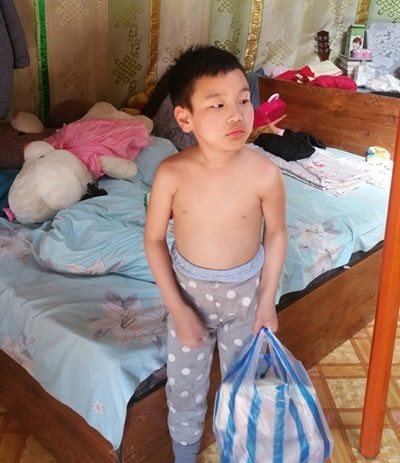
A young recipient of Lamp of the Path’s services in Mongolia.
Lamp of the Path NGO (LOP), part of Ganden Do Ngag Shedrup Ling, has offered social services to some of the poor and homeless living in Ulaanbaatar, Mongolia for the past eighteen years. The soup kitchen, which is its main program, offers food to those in need and free medical support is offered through a health clinic. LOP also helps bring awareness to the epidemic of alcoholism in Mongolia and offers tuberculosis checkups for the disadvantaged in the area.
A grant for US$35,281 was offered to this beneficial project toward the 2021 operating budget.
The Social Services Fund has been providing annual grants to the incredible work of LOP since 2012 and in total has offered over US$318,000.
Please watch this moving video featuring the lives of three individuals who have been positively impacted by the services offered by Lamp of the Path.
MAITRI Charitable Trust, Bodhgaya
MAITRI is engaged in the eradication of leprosy, the control of TB, medical assistance and care for expecting mothers and new born babies, life-saving assistance to malnourished small children, education of children and adults in rural areas, rehabilitation of disabled people, the provision of opportunities to women and other underprivileged people, promotion of a holistic development in villages, rescuing and care of animals, and awareness campaigns for all of these programs.
In 2021 during the lockdowns, MAITRI’s work continued, as they had inpatients in the hospital and animals in the shelter, the staff came to work regularly. They were provided with face masks and Vitamins C and D to boost their immune system and the staff were grateful to have a regular job and regular income. Registered patients of the TB and mother and child care programs defied the lockdown restrictions and came to the gates for their monthly rations which MAITRI duly provided.
During the year the programs continued with new patients being registered and others being released from treatment. In particular, MAITRI helped to hospitalize two leprosy patients and with MAITRI’s special treatment their condition has been greatly improving. The work of the animal care program continued with the rescuing of animals in distress and injured, including a monkey.
A grant for US$68,600 was offered to this beneficial project in 2021 toward the operating budget.
The Social Services Fund has been providing annual grants to the incredible work of MAITRI since 2012 and in total has offered over US$606,000.
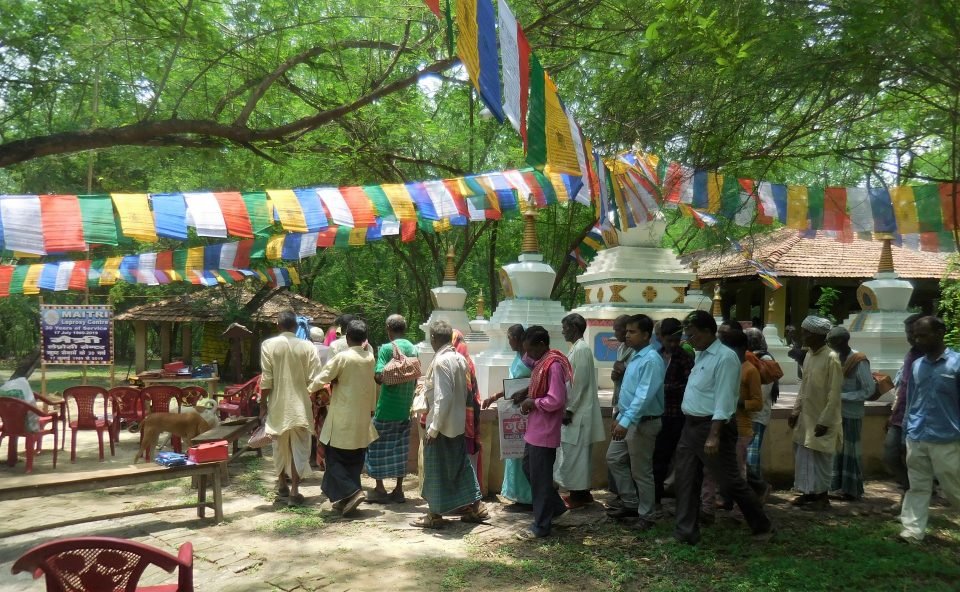
Participants of a community event gathered around stupas at MAITRI Charitable Project, July 2019.
Helping Nepali and Tibetan Refugees Affected by the Pandemic
Kopan Helping Hands has been distributing food to families affected by the pandemic and who have lost their livelihood due to the lockdowns and restrictions. Kopan is working with the local government to identify families most in need and distribute food to as many as 400 families. In addition, Kopan is working with trusted local contacts to identify elderly people living by themselves and families without any means of support in the Upper Solu Khumbu area of Nepal. Food will likely be distributed to them through the local shops. Lama Zopa Rinpoche recently spoke to the senior Kopan monks about how important it is for monks and nuns to engage in social activities that directly relieve the suffering of sentient beings. However, in addition to the immediate benefit, Rinpoche emphasized that by seeing monks and nuns do activities for their benefit, people will develop faith in them and this will plant the seed of liberation in their minds and cause them in future lives to meet the Dharma and the Sangha.
Lama Zopa Rinpoche offered a grant of US$20,000 to Kopan Helping Hands toward these food distribution efforts.
The Central Tibetan Relief Committee (CTA) arranged support in the form of direct cash assistance as an emergency relief measure, to alleviate the financial burden of the most vulnerable households. Cash assistance will help these homes meet basic nutrition and financial security needs over the next several months, and prevent them from falling into deep poverty due to their inability to earn income during the pandemic.
The financial impact of the pandemic has been especially devastating for the poorest households in Tibetan settlements. According to a rapid survey conducted in June, 2,774 households across India, Nepal, and Bhutan are now struggling to afford basic necessities, and are at risk of falling into a cycle of poverty from which they cannot soon reemerge. The CTA offered a one-time payment of 10,000 Indian rupees for each household (1,000 rupees per month for ten months).
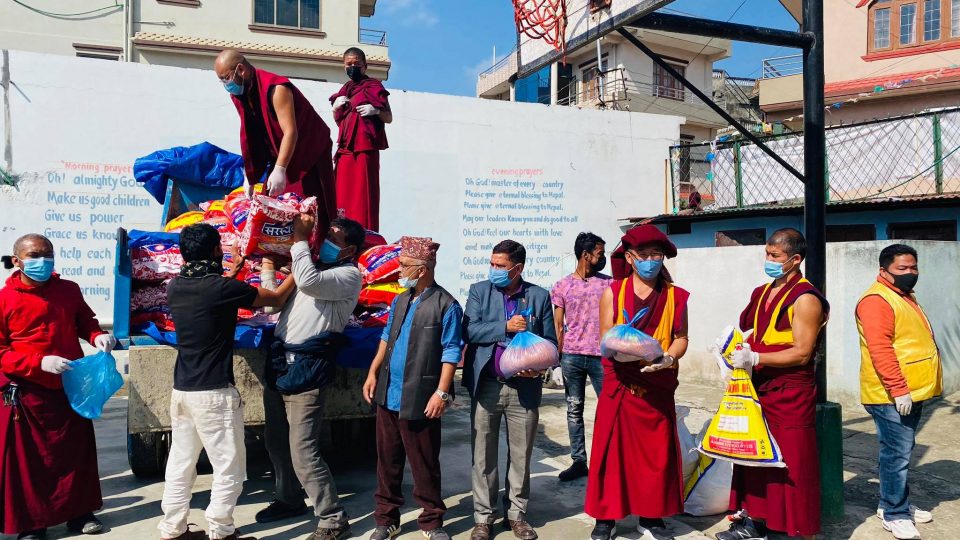
Kopan Sangha distributing emergency aid to those in need during covid-19 crisis in Nepal. Photo courtesy of Kopan Monastery Facebook page.
Emergency cash relief is expected to help enable them to maintain financial stability in the short term, and increase their ability to regain or advance toward self-reliance when economic activity normalizes.
Lama Zopa Rinpoche offered a grant of US$50,000 toward this beneficial initiative of the CTA.
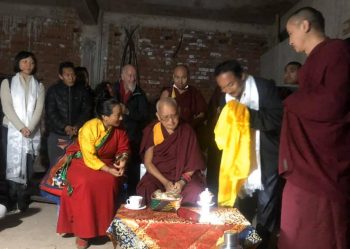
Lama Zopa Rinpoche and Khadro-la visiting the site where the new Tsum Community Center is being built, in 2020.
Tsum Community Center, Nepal
This year the Social Services Fund was happy to support the construction of a new community center in Kathmandu to support those from the Tsum region. This new community center is being built in the area of Swayambhunath and the community center will serve as a place for people to gather and offer prayers, particularly at the time of death, by offering a space for the final rituals before cremation. The other objective of this center is to teach the younger generation in the area about the cultural traditions of Buddhism as they are not taught this in their schools.
In 2021 US$ 40,996 was offered toward the building expenses of this community center.
Rejoice!
Please join us in rejoicing in some of the ways that FPMT is offering direct support for those most in need in India, Nepal, and Mongolia by providing grants for medical and heath care, food, and living expenses. In 2021 we have offered US$257,531 so far this year. Thank you to the many who make these grants possible and continue to support the Social Services Fund.
All are welcome to support the Social Services Fund and help ensure we can continue to offer support toward the health of those in need.
- Tagged: kopan helping hands, lamp of the path, maitri charitable trust, patient care trust, shakyamuni buddha health care center, tsum
10
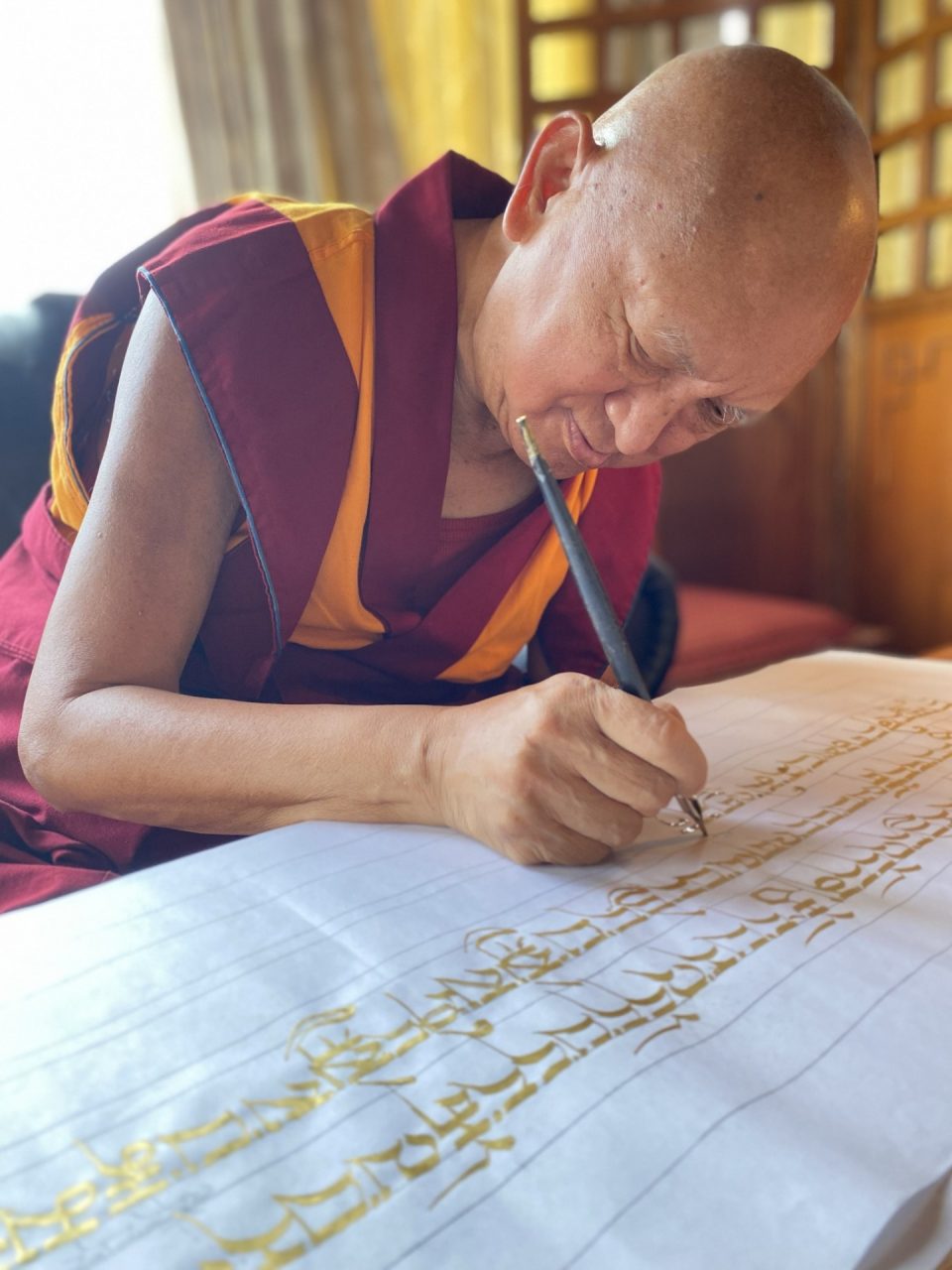
Lama Zopa Rinpoche writing out the Prajnaparamita in pure gold, Kopan Monastery, Nepal, August, 2021. Photo by Ven. Roger Kunsang.
Recently we shared a video from Lama Zopa Rinpoche explaining some of the profound benefits of writing out the Prajnaparamita Sutra, and some of the history of Rinpoche’s ongoing project to write out this sutra in pure gold which Rinpoche and others have been undertaking for sixteen years including Ven. Tsering, Jane Seidlitz, and recently a monk from Kopan Monastery and a nun from Khachoe Ghakyil Ling Nunnery have joined these meritorious efforts.
We are pleased to share PART TWO of Rinpoche’s teachings on the benefits of Prajnaparamita and invite you to rejoice, again, that after a ten year break due to a stroke, Rinpoche is now writing out this sutra in pure gold again.
By hearing this sutra, writing it down, reading it aloud, or memorizing it, you create more merit than is fathomable. Rinpoche explains that by doing so, from life to life you crush the oceans of samsaric suffering, you crush the delusions. That is how profound this sutra is, it enables you to reach enlightenment.
The Prajnaparamita Project is an FPMT Charitable Project which covers the cost of gold, paper, and calligraphy pens for the ongoing writing out of this most precious and beneficial sutra by Rinpoche and others.
You can learn more about the Prajnaparamita Project as well as the other Charitable Projects of FPMT.
- Tagged: holy objects, prajnaparamita, prajnaparamita project, sutra, sutras
27
Rejoicing in Offerings to Holy Objects in 2021
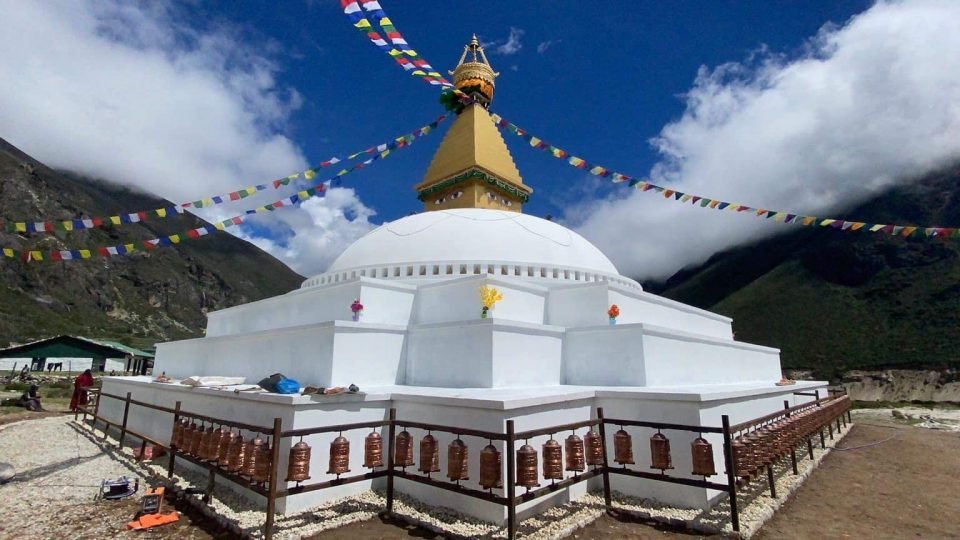
The completed Thame Stupa.
When discussing his Vast Visions for the FPMT organization, Lama Zopa Rinpoche said, “My wish is for FPMT to build many holy objects everywhere, as many as possible. Making it so easy for sentient beings to purify their heavy negative karma and create extensive merit, which also makes it so easy to achieve the realizations of the path to achieve liberation and enlightenment.” In his March 10 thought transformation teaching, Rinpoche explained that, “Every single holy object is the basis for you to create all the merits that bring every success and pleasure that you experience now, as well causing your future liberation and enlightenment. Whether a person is Buddhist or not, just seeing a holy object allows them to create soooo much merit.”
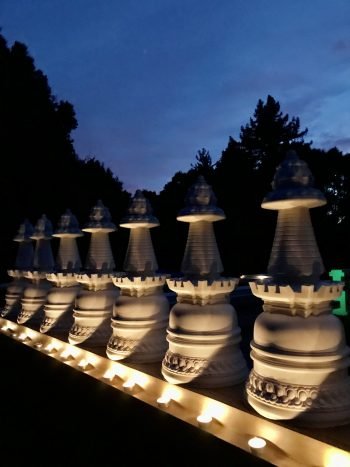
Kadampa stupa wall at the Mahabodhi stupa, Land of Medicine Buddha, CA, US.
Further, as Buddhism continues to spread around the world, clear and accurate translations of Buddhist texts, prayers, and teachings—which are also holy objects—are crucial; and distribution of these texts is essential so that interested students can retain access to authentic teachings.
Please find details on how a number of the FPMT Charitable Projects recently supported the creation of holy objects, such as stupas, prayer wheels, and statues; arranged monthly offerings to precious holy objects; and offered grants for the translation, printing, and circulation of Dharma texts.
Stupas
About the benefits of building stupas, Lama Zopa Rinpoche has said, “We can build stupas to inspire people without even teaching Dharma. However many hundreds and billions of years the holy object lasts, it continues to liberate many sentient beings every day, freeing them from the lower realms, causing them to actualize the path, liberating them from samsara and bringing them to enlightenment. After we die, even if we are in another universe, in the hell realms or a pure land, wherever we are, the stupa that we built or helped to build, is continually benefiting sentient beings. It is incredible how we can continually benefit sentient beings by building a stupa.”
Mahabodhi Stupa at Land of Medicine Buddha, CA, US
On the advice of Lama Zopa Rinpoche, Land of Medicine Buddha has been building a 39-foot-tall Mahabodhi Stupa in California for the past seven years. This stupa will be the main attraction of the 100,000 Stupa Project in a beautiful garden featuring an area to meditate, thousands of memorial stupas, places to perform prostrations, and areas with spots for reflection and contemplation. While observing proper protocol for themselves and others during the pandemic, work continued at the Stupa Project in 2020 and is ongoing.
Highlights from the ongoing work include: Artist Gelek Sherpa continued to create and apply decorative panels to the main stupa and is now working on the fifth of the seven levels of the stupa and creating silicone molds, casting cement, and doing finishing artist work; last year the first twenty Kadamapa stupas were placed on the inner mandala wall. In the coming month these stupas will be painted and filled. More than twenty new stupas have been sponsored this year! In 2021, US$25,000 was offered for the stupa and an amazing US$137,743 in total has been offered from the Stupa Fund. You can learn more about this stupa and support it directly.
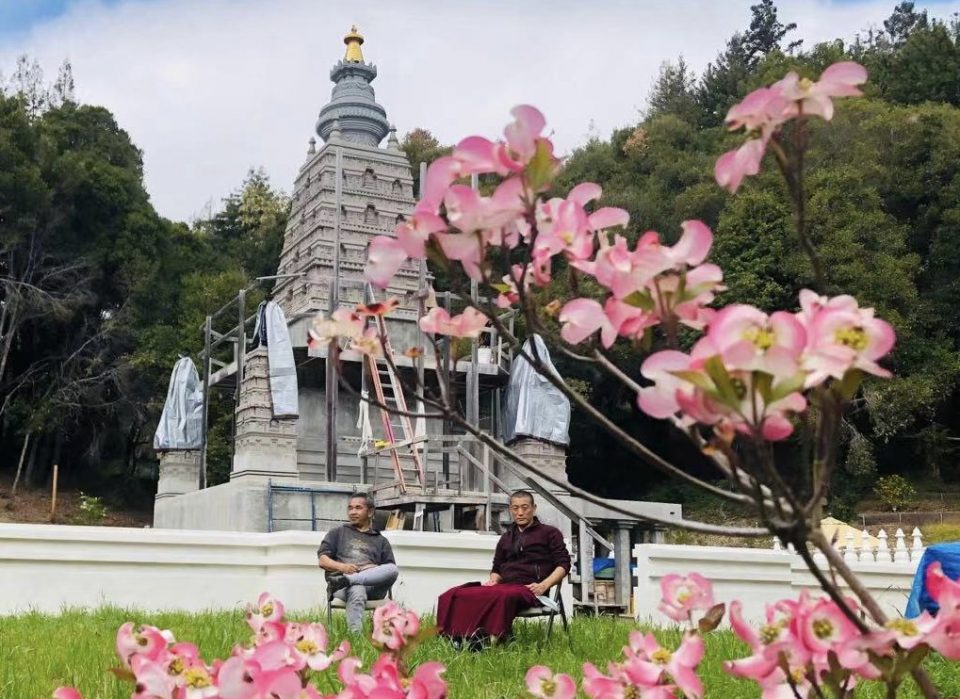
Mahabodhi stupa at Land of Medicine Buddha with holy object artist Gelek Sherpa and Ven. Samten sitting at the base. Photo courtesy of Land of Medicine Buddha.
Thame Stupa
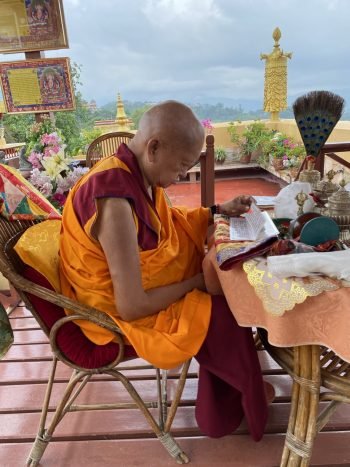
Lama Zopa Rinpoche consecrating a stupa the Holy Objects Fund is sponsoring in Thame, Nepal. Rinpoche offered this consecration remotely from Kopan Monastery, June 21, 2021. Photo by Ven. Roger Kunsang.
The Thame region of Nepal was seriously damaged during the 2015 earthquake. Almost all the homes in the area were damaged and also a large very precious stupa was destroyed. The monks from Thame Monastery requested Lama Zopa Rinpoche’s help to rebuild the stupa, as it was the biggest holy object in the region. Lama Zopa Rinpoche was very happy to do this and through the Stupa Fund covered the entire cost of the building of the stupa as well as a large prayer wheel inside and prayer wheels around the stupas. The new stupa stands nearly 46 feet tall with a base measuring 54 feet across, took two years to complete, and is larger than the one which previously stood. This impressive stupa features a large prayer wheel inside making it possible for pilgrims and locals to enter the stupa and spin it to create so much merit, even when the area is covered by snow.
The stupa was to be officially consecrated in June 2021, but unfortunately Lama Zopa Rinpoche was not able to travel there due to the pandemic and restrictions. A smaller consecration occurred, as all the materials had already been prepared, and at the same time Rinpoche offered the puja and prayers and consecrated the stupa from afar at Kopan Monastery.
Prayer Wheels
About prayer wheels, Lama Zopa Rinpoche has explained, “Prayer wheels are my hobby, there are so many benefits from building prayer wheels. It blesses all the insects on the ground and in the area, this is besides all the people who turn it. It is such a great blessing for the area! It is a quick way to liberate sentient beings from the lower realms, which is where they have been for numberless times, and enlighten them.” Reciting OM MANI PADME HUM as much as possible while turning the prayer wheel is a quick way of enlightening one’s self and others. Just by turning one time provides the benefit of having done many years of retreat, in a few seconds. It is unbelievable purification and one can collect skies of merit. Why? Because, as Rinpoche has explained, you receive the blessings from the heart of Chenrezig, the buddha of compassion. This is a quick way of developing compassion for sentient beings and in this way you can help others develop enlightenment more quickly.
Prayer Wheel Sponsored in Taplejung, Nepal
A new 9-ft high, 6-ft wide prayer wheel is being built in Taplejung, Nepal, for the benefit of all in the area which includes a school for children which the Social Services Fund has recently started supporting, as well as an elderly home for those in advanced age in the community. In 2021, US$30,100 was offered through the Prayer Wheel Fund for the building of the prayer wheel, prayer wheel house, and mantras needed for this project.
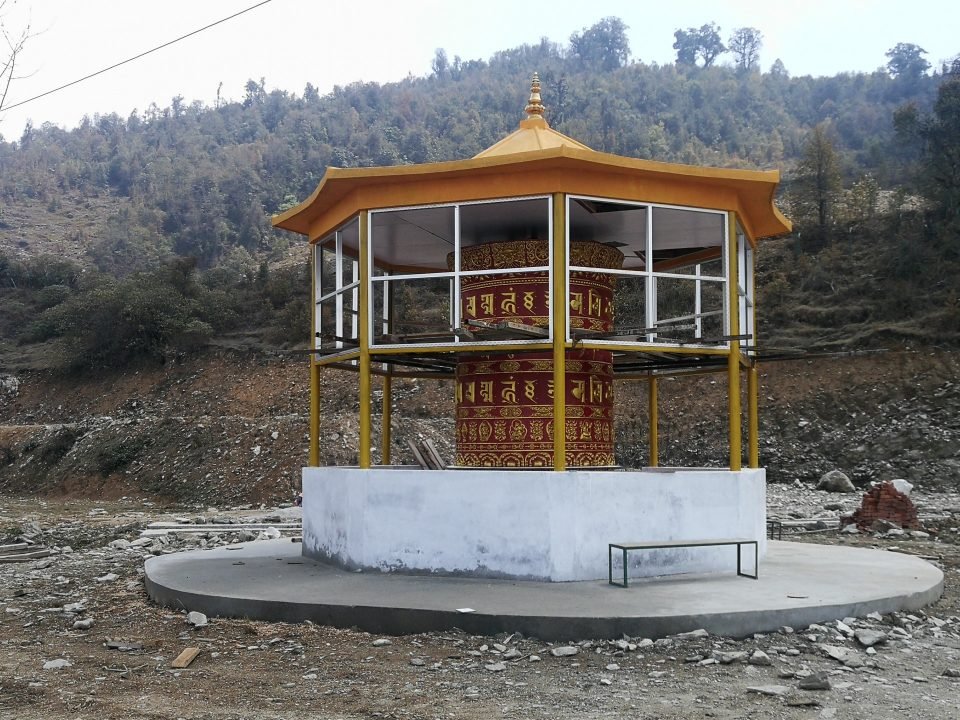
New prayer wheel being built in Taplejung, Nepal.
Ongoing Offerings to Precious Statues and Stupas
From the Sutra of the Mudra of Developing the Power of Devotion:
The minute you see a holy object you create infinite merit,
So no question, if you actually make prostrations,
Offerings and so forth, you create far greater merit.
Every full moon and on each of the Buddha multiplying days, on behalf of all FPMT, the Puja Fund sponsors the repainting of the Boudhanath and Swayambunath stupas, as well as the best quality cloth to the umbrellas at the pinnacles. Gold and robes are offered to the Jowo Buddha statue in Tibet and robes are offered to the Buddha statue in the Mahabodhi Temple in Bodhgaya. Rinpoche has advised that these important offerings happen for as long as FPMT exists, to generate merit for all those working within the organization and to help ensure the success of all the beneficial activities within FPMT.
Statues
“Just seeing a portrait or statue of Buddha purifies our mind and plants the seed of enlightenment. Whether we are believers or non-believers, we get that benefit, to be free from oceans of samsaric suffering. We have never been free from suffering, since beginningless rebirths up until now, so it gives us that incredibly precious opportunity.” — Lama Zopa Rinpoche
Padmasmabhava Statue at Nalanda Monastery, France
Following the advice of Lama Zopa Rinpoche, Nalanda Monastery is building a 1.82 meter (almost 6 feet) statue of Padmasambhava. The statue will be very visible to everyone who visits Nalanda and will be placed above the lake. The Padmasambhava Project for Peace was so happy to offer US$5,000 toward the statue. The total project cost €45,000 and this includes making the statue, gilding it with 24-carat gold, shipping it from Nepal to France, and filling it with mantras and life tree, and building the platform and roof. You can learn more about this statue and donate directly.
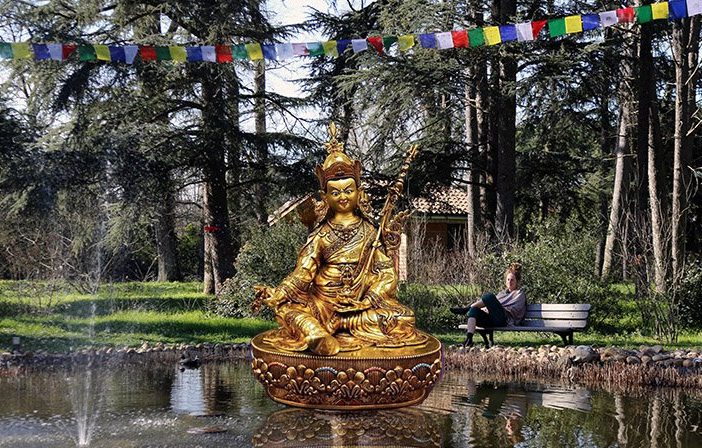
Depiction of the six-foot Padmasambhava statue which will be located in the lake next to Nalanda Monastery, France.
108 Aspects of Chenrezig at Kopan Monastery, Nepal
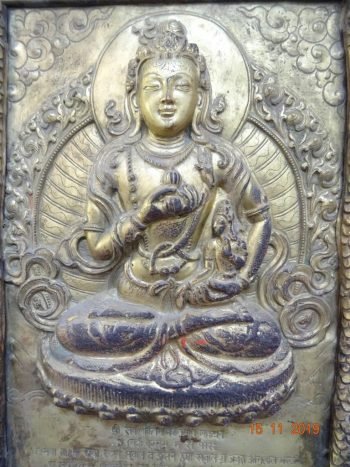
One of the manifestations of Chenezig statues
Lama Zopa Rinpoche offered over US$65,340 toward the creation of 108 aspects of Chenrezig, these statues will be three dimensional tiles that are on the walls of the newly built Chenrezig gompa at Kopan Monastery.
Padmasambhava Statue in Maratika, Nepal
A 45-foot tall Padmasambhava statue with a 15-foot tall throne is planned to be built in Maratika, the holy place where Padmasambhava achieved immortality through his practice of Amitayus. This incredible statue will have a gold face, hands, and body. The aspect of this statue is the first manifestation of the Twelve Manifestations of Padmasambhava, Gyalwey Dungdzin (Padma Gyalpo), and is Guru Rinpoche’s magnetizing form. Recently Lama Zopa Rinpoche and Rangjung Neljorma Khadro Namsel Drönme (Khadro-la) offered pujas and consecrated the land where the future statue will be built. The construction will take approximately five years.
Texts
Sponsorship of Bengali Translation of Nalanda and the Seventeen Pandits
Through the Education and Preservation Fund we were delighted to sponsor the translation of Nalanda and the Seventeen Pandits from Tibetan to Bengali. The seventeen pandits of Nalanda refers to a grouping of seventeen of the most important and influential Mahayana Buddhist masters from India’s past. Translations like this are instrumental in reviving Mahayana Buddhism in Bengali from where great Buddhist masters like Santaraksita, Atisha, and Santideva were born.
Printing Rare and Precious Heruka Body Mandala Commentary in Tibetan
After many years in process, the two volume commentary on Heruka Body Mandala by His Holiness Trijang Rinpoche has been completed by Geshe Rinchen with a team of Lamas of Sera Mey Monastery! Lama Zopa Rinpoche sponsored the printing of 2,000 copies for free distribution to 20 different monastery libraries in India, which cost over US$20,000. The translation of this commentary was worked on for many, many years and is a tremendous accomplishment.
Writing of the Prajnaparamita
Ven. Tsering has been continually writing out the Prajnaparamita Sutra in gold ink on rainbow paper for more than sixteen years and is working on volume six of twelve. Recently we shared the news that after a ten year pause, Lama Zopa Rinpoche is again writing the 8,000 verse Prajnaparamita Sutra. Two other students in the US and Nepal are also working on writing different volumes of this precious sutra and a monk at Kopan Monastery is also beginning to write it out. Rinpoche has explained that by writing even one word of Prajnaparamita, the teachings on emptiness, you create far greater merit than making skies of offerings to numberless buddhas for many eons. The Prajnaparamita Project offers US$25,000 a year which includes all the costs related such as gold and paper. Recently, Rinpoche shared on video some of the history of this project, the benefits of writing out this most precious sutra, extensive commentary on the incredible benefits of the sutra, the process for doing so, the quality needed in the writing and supplies, and other details related to the process.
Please Rejoice!
Lama Tsongkhapa taught that the best way to collect merit is through rejoicing. Lama Zopa Rinpoche has explained that every time you rejoice in an offering, the construction of a holy object, and in the effort of all those who are working to actualize beneficial activities, the merit doubles. When you rejoice the second time, the merit is multiplied by four. The third time, it is multiplied by eight. It simply makes good sense to incorporate rejoicing into one’s daily practice!
All of these offerings toward the creation and preservation of holy objects as well as the translation and distribution of precious Buddhist texts are made possible by the kindness of so many people who offer support to the Holy Objects Fund, as well as to those who work on building, taking care, and making offerings to the holy objects; translating texts; and through offering service in so many ways to these most powerful and beneficial projects.
All of these offerings are made on behalf of all the FPMT centers, projects, services; and all students, benefactors, and anyone offering service to the FPMT organization.
If you would like to contribute to the building of holy objects around the world, you are welcome to offer any amount to the Holy Objects Fund which contributes to the creation of stupas, prayer wheels, and statues.
- Tagged: chenrezig statue, Education and Preservation Fund, holy objects fund, mahabodhi stupa, maratika, nalanda monastery, padmasambhava project for peace, padmasambhava statue, taplejung stupa
26
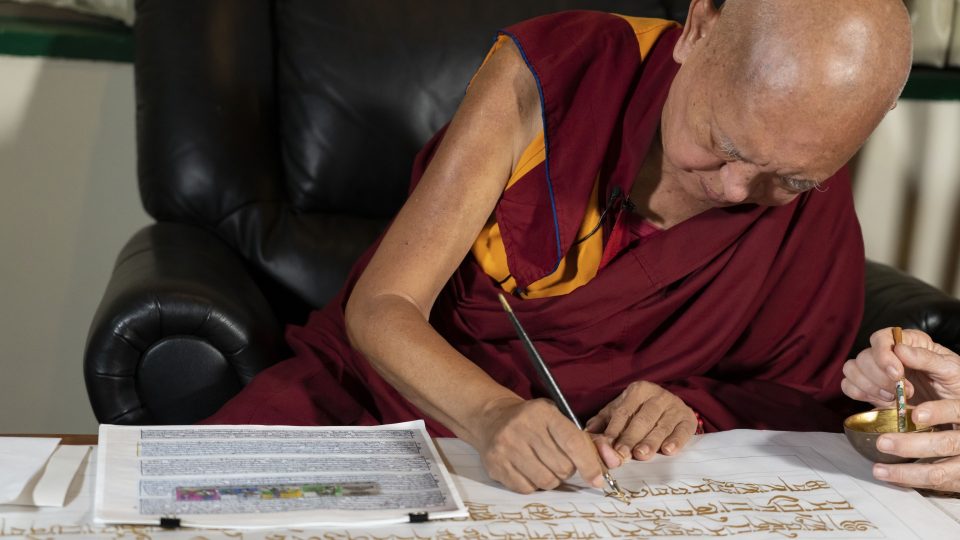
Lama Zopa Rinpoche writing out the Prajnaparamita, Kopan Monastery, Nepal, August 21, 2021. Photo by Ven. Lobsang Sherab.
“Even writing one letter from Prajnaparamita, even writing one letter, one syllable, the benefits are unbelievable, unbelievable, more than making extensive offerings, skies of extensive offerings to all the buddhas, so many eons, the merits you collect are unbelievable.” — Lama Zopa Rinpoche
The Prajnaparamita Sutra contains the highest teachings of the Buddha and is among the most precious texts available in the world today. Due to the power of this text, writing it out is a way to generate tremendous merit and receive blessings. In May we shared the incredible news that Lama Zopa Rinpoche has started writing out this sutra in pure gold after a ten year break due to Rinpoche’s 2011 stroke.
In a recent video, Rinpoche talks about the history of the project to write out the Prajnaparamita in gold, which Rinpoche and a few others have been working on for the past sixteen years. Rinpoche discusses the benefits of writing out this precious sutra, giving extensive commentary on the sutra’s incredible benefits. He also talks about the process for writing it out, including the need for precise calligraphy and high quality supplies.
Rinpoche released two videos on this topic and we are delighted to share the first video with you!
https://youtu.be/66vb6_cjnvM
Some of the advice Rinpoche translates in this teaching includes:
“By writing the Prajnaparamita we create more merit than making offerings to the three great thousand world systems completely filled with Mount Merus of stupas made of the seven types of jewels. We receive patience in the profound Dharma, emptiness, and we have no fear of meditating on emptiness, as quickly as the snap of a finger. All previous merits are small compared to this.
“After writing the Prajnaparamita, if we reveal it, we collect far greater merit than if we engaged in the five paramitas for ten eons, or listened to teachings on emptiness for ten eons. If we show the teachings of the Prajnaparamita to one sentient being, we collect even greater merit. If, after writing the Prajnaparamita, we meditate on emptiness for the duration of one snap of a finger, we create far greater merit than if we revealed the teachings to others for ten eons.”
The Prajnaparamita Project is an FPMT Charitable Project which covers the cost of gold, paper, and calligraphy pens for the ongoing writing out of this most precious and beneficial sutra by Rinpoche and others.
In the coming days we will share the second part of Rinpoche’s video on this subject.
You can learn more about the Prajnaparamita Project as well as the other Charitable Projects of FPMT.
- Tagged: prajnaparamita, prajnaparamita project
10
Benefiting the Animals– Rejoicing in a Year of Support Offered
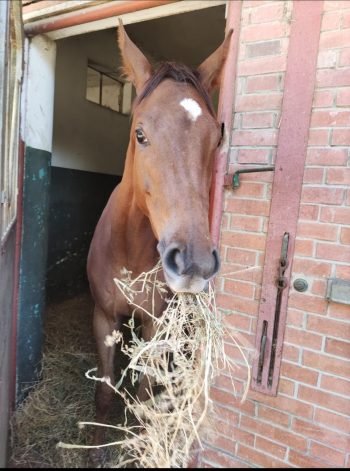
Jangchub enjoying her new home at Aquila Nero Animal Sanctuary.
Benefiting animals in any way possible is a high priority for FPMT and one of Lama Zopa Rinpoche’s Vast Visions for the organization. Lama Zopa Rinpoche has explained many ways that we can benefit animals, not just by saving them from untimely death and caring for them for the rest of their lives, but also by benefiting them with mantras, prayers, and holy objects.
We invite you to join us in rejoicing in a few of the ways the Animal Liberation Fund has benefited animals in recent months.
Jangchub is a two year old female horse who was born with a genetic problem with her feet. She is not able to run and can only gallop. Because of this, she was seen as useless and was going to be put down. Aquila Nera Horse Sanctuary in Italy, which has a close connection with Istituto Lama Tzong Khapa, offered to let Jangchub live the rest of her life at their facility and cover her vet and medical expenses. The Animal Liberation Fund sponsored her food for the year.
Please enjoy this touching video of Jangchub’s arrival to the sanctuary: https://youtu.be/iCIH54Z0DbU
Due to his concern for the welfare of all living beings, Lama Zopa Rinpoche initiated the purchase of and raised the funds for the land near Kopan Monastery for the Animal Liberation Sanctuary to provide shelter and care for animals rescued from being killed, so that they may live out their natural lives in peace and attain a higher rebirth. The sanctuary benefits rescued animals, not only by freeing them from impending death, but also by exposing them to Buddha’s teachings. They regularly hear mantras and are led around holy objects. The animals are receiving shelter, food, veterinary care, kindness, and Dharma. The sanctuary has a main animal shelter designed to provide a healthy environment throughout Nepal’s seasons, has facilities to separate weaker animals from the main flock, and is designed to reduce water use and waste. The sanctuary has an animal shed, treatment and isolation building, quarantine area, and caretaker house. Every year since 2012 we have been supporting this sanctuary with an annual grant, and in 2021, US$9,800 was offered. Since 2018, US$79,400 has been granted to the sanctuary for the food, medical care, shelter, and support for the caretakers.
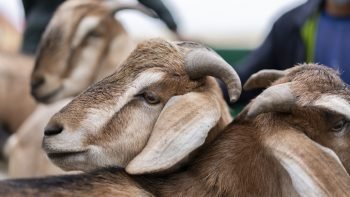
Rescued goats receiving a blessing from Lama Zopa Rinpoche in Kathmandu, Nepal. Photo by Ven. Lobsang Sherab.
Over the last few months Rinpoche has bought fifteen goats from butchers on the side of the road in Kathmandu. These animals were liberated on behalf of His Holiness the Dalai Lama, all the Kopan monks and nuns, and for the Indian and Nepali people to be free from COVID-19. The goats were saved from death and will live the rest of their lives at the Animal Liberation Sanctuary or at Kopan Nunnery. Whenever Rinpoche sees goats tied up near the butcher shop, it is very hard for him not to buy the goats, often he stops the car and loads the goats without delay. If it is not possible to buy the goats, then Rinpoche will immediately start extensive prayers for them.
Taru Gayphel Tsogspa Animal Welfare Society is an animal care facility located in Ladakh caring for eighty-five animals. The Animal Liberation Fund recently offered a grant of US$20,000 for the continual care of all the animals at the facility for food, medicine, and shelter; and for upkeep of the premises. Additionally, Lama Zopa Rinpoche asked that eight five-foot high stupas also be built on the land, so that the animals can circumambulate the stupas.
The Animal Liberation Fund sponsored the liberations of approximately 71,791 animals at Kachoe Dechen Ling, California, and Buddha Amitabha Pure Land, Washington State, in 2020. Since 2015, 884,246 small animals have been saved from untimely death by resident Sangha and taken around an incredible number of holy objects. Mantras were recited and blown on them, and they were carefully placed where they could live out the rest of their lives. When Sangha finish these liberations, they make strong prayers for all those who are sick, have recently died, or who have requested prayers, as well as for the very long life of Lama Zopa Rinpoche and His Holiness the Dalai Lama. All are welcome to request prayers and dedications from the Sangha for themselves or loved ones.
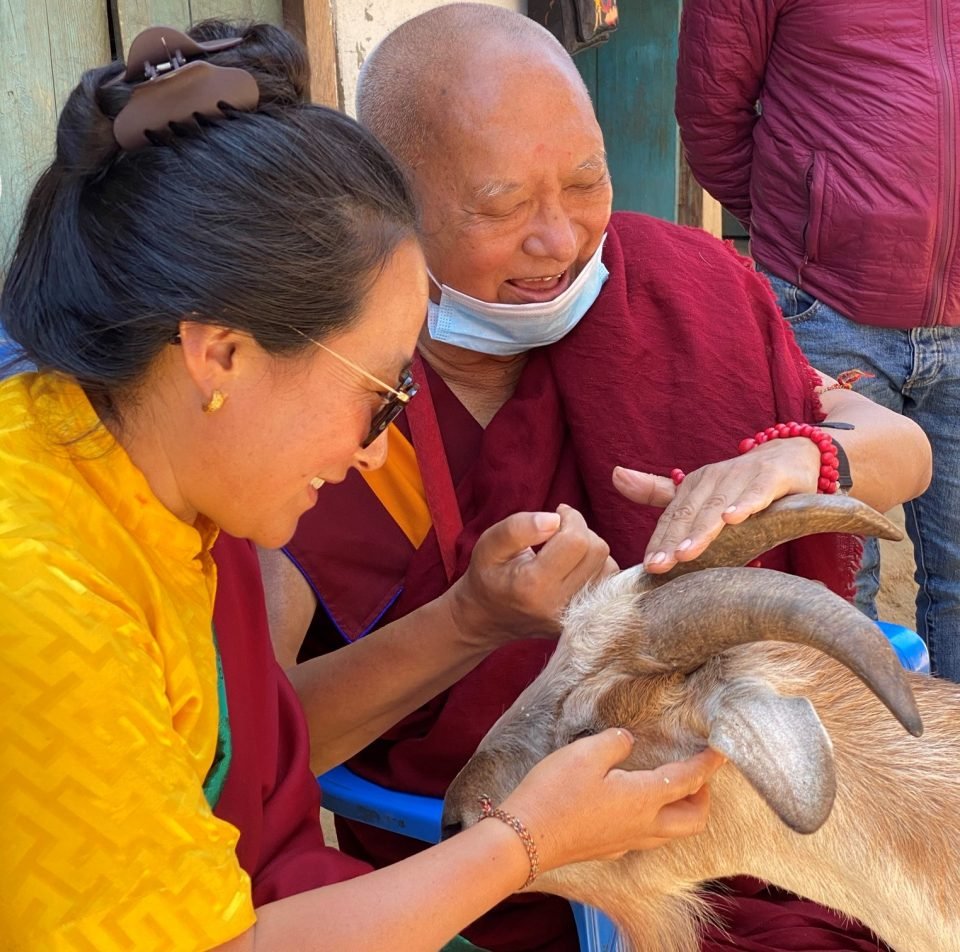
Khadro-la and Lama Zopa Rinpoche blessing goats in Maratika, Nepal, April 25, 2021. Photo by Ven. Roger Kunsang.
In 2018 Lama Zopa Rinpoche saved five goats that were destined to be killed in Maratika, Nepal. Since then we have been providing the cost of their food and care. And in 2021 Rinpoche and Khadro-la blessed the goats while they were in Maratika, reciting mantras and prayers for the goats and tying a blessed red cloth around their necks, which apart from being blessed with mantras, also shows that the animals have been saved from the butcher. The animals live in town, go out to pasture during the day, and are often seen at the Maratika Cave. They are fed well, get medical attention when needed, and prayers are done for them.
Please rejoice in another year of support offered to precious animals around the world who desperately need our help and cannot advocate for themselves or create merit on their own.
All are welcome to contribute to the Animal Liberation Fund to help ensure that our work sponsoring animal liberations around the world continues.
- Tagged: animal liberation fund, animal liberation sanctuary, Aquila Nera Horse Sanctuary, Taru gayphel tsogspa animal welfare society
4
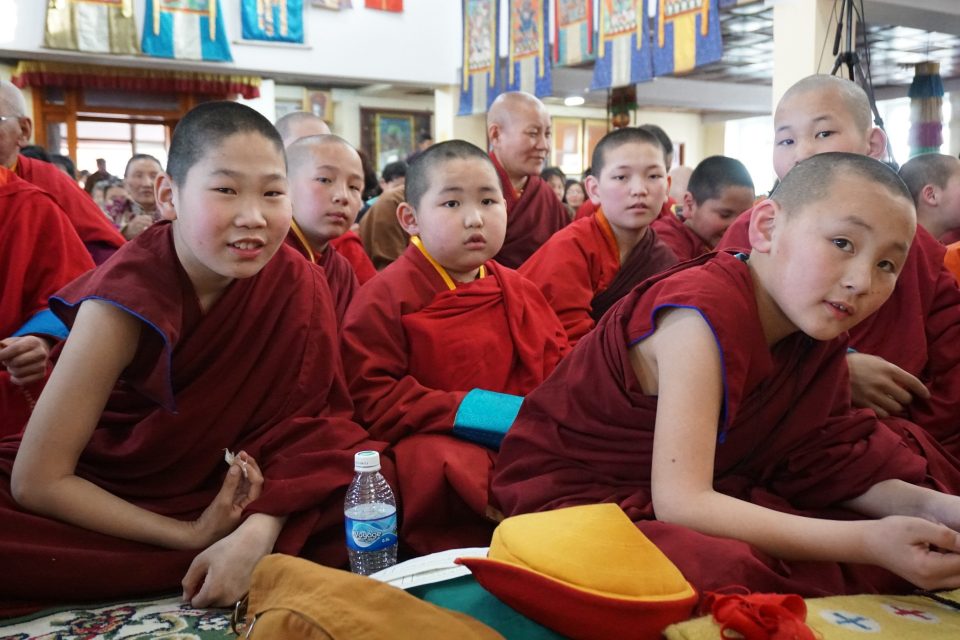
Young monks of Idgaa Choizinling Monastery, Mongolia, during long life puja for Lama Zopa Rinpoche in 2017. Photo by Ven. Lobsang Sherab.
In Lama Zopa Rinpoche’s May 10, 2021 thought transformation teaching, he explained that the Sangha are the “real heroes” among us because they are working to defeat the delusions and thus living the best lives as human beings. Supporting monks and nuns is one of the highest priorities for the FPMT organization and the Supporting Ordained Sangha Fund offers support to nunneries and monasteries around the world for food, accommodation, health care, education, and practice.
We would like to invite you to rejoice in some of the ways we have been able to offer support to Sangha this year.
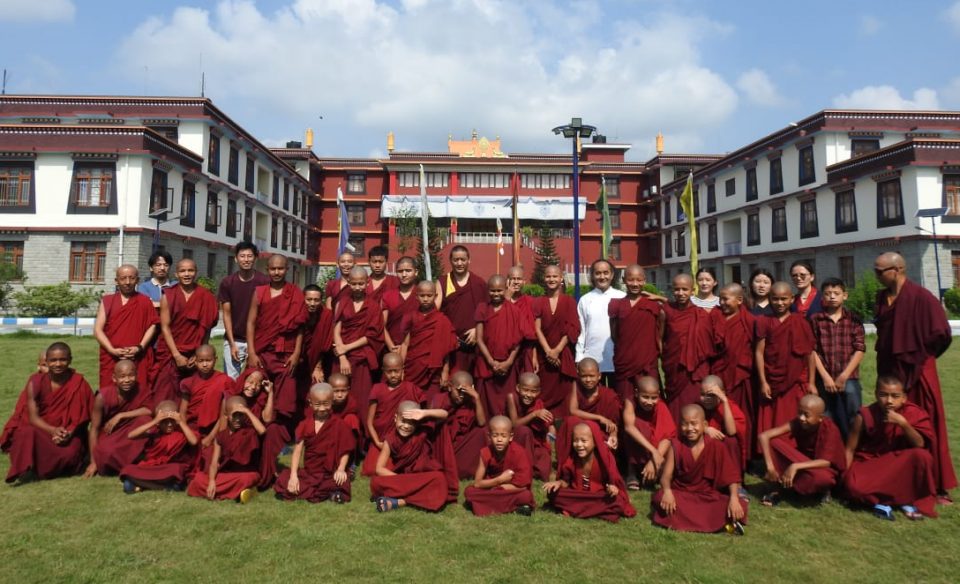
Some of the monks of Shalu Monastery.
For the last four years we have offered a grant to Shalu Monastery, Himachal Pradesh, India, to cover the costs of food for the 50+ monks who study there. This year, US$16,779 was offered.
Since 2009 we have been sponsoring the nuns of Tashi Chime Gatsal Nunnery, a Kagyu nunnery in Nepal, to complete two 100 million mani retreats (100 million recitations of the mantra OM MANI PADME HUM) each year. In addition to sponsoring the 100 million mani retreats, offerings are made to cover the cost of food for all during this period as well as an offering for a qualified geshe to stay during the retreat in order to give lamrim teachings. In addition, three teachers’ salaries were sponsored for 2021. US$17,181.57 was offered to cover these costs.
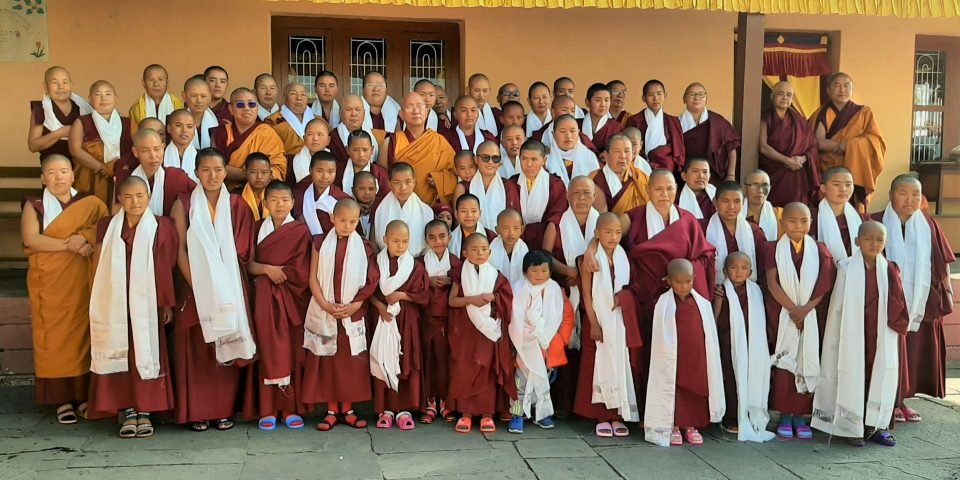
Some of the nuns of Tashi Chime Nunnery.
We offer three meals per day to the monks of Thame Monastery. There are currently 22 monks in this monastery. Thame is in Solu Khumbu, high in the Mount Everest region of Nepal. It is a special place for FPMT as Lama Zopa Rinpoche was born there and it is located near Lawudo which was the home of Rinpoche’s previous incarnation. The annual cost for offering food to the monks of Thame Monastery is US$9,263.
We offer daily lunches to the monks of Idgaa Choizinling Monastery, Mongolia. Idgaa Choizinling has a branch also in Sera Je Monastery, India, and serves as a focal point of Buddhist learning in Mongolia. Since the monastery’s inception we have been offering food every day to the 60 monks studying there. This year we were happy to offer US$10,800 for this.
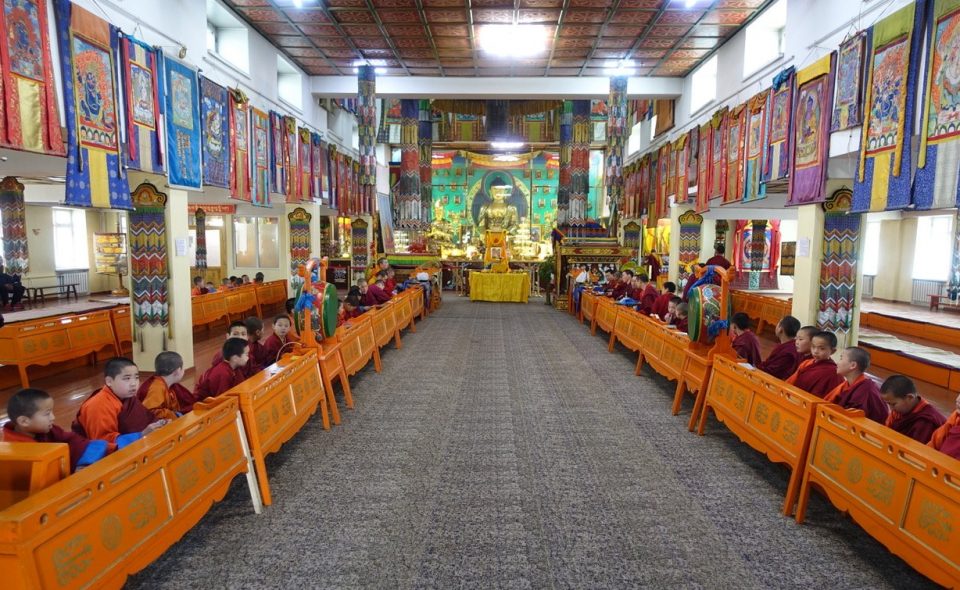
Some of the young monks of Idgaa Choizinling Monastery, Mongolia.
Current regulations prohibiting religious gatherings have negatively impacted monasteries and nunneries all over India and Nepal who rely on income from offering the service of pujas and other prayers or practices for individuals who request this from around the world. Many of the monasteries have had to close the communal kitchens and are delivering dry food supplies to the monks individually to cook themselves. This ends up costing substantially more for the monasteries. Gaden Jangtse Monastery, located in Mundgod, India, home to 1,530 monks, requested help for food for the monks during this time and we were so happy to be to offer US$39,882 to cover the costs of their food fund for three months.
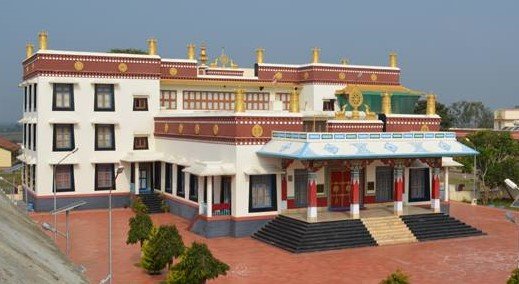
Gyudme Monastery. Photo courtesy of Gyudme Monastery Facebook page.
We were delighted this year to offer US$400,000 toward the creation of a food fund for the 575 monks of Gyudmed Tantric University, Mysore, India. This great monastery has an excellent reputation and has produced many educated and highly realized practitioners. To sustain this high level of achievement it is essential that the monks can dedicate themselves completely to the extensive studies at the monastery. The intense study necessitates that the monks stay healthy and fit and do not become preoccupied with having to provide for their own basic food needs. This offering toward a food fund will allow the monks to concentrate on their studies without the stress of uncertainty regarding nutrition.
The Supporting Ordained Sangha Fund also offered a grant toward completion of Losang Namgyal Rinpoche’s gompa in Bouddhanath. This gompa is specifically a place for the Tamang people to practice. Offerings were made toward repairs of Serkong Dorje Chang’s Monastery in Swayambunath, Nepal, and also to Tashi Lhunpo Monastery toward the costs associated with the Winter debate (Jamyang Gunchoe), Geluk Exams, and Shungchen Debates.
Please join us in rejoicing that we have been able to offer this essential support to the Sangha. Incredibly, US$476,725.50 has been granted this year so far.
All of these offerings are made possible due to the kindness of so many who donate to the Supporting Ordained Sangha Fund. This is something incredible to rejoice in. As Lama Zopa Rinpoche has explained, “taking responsibility for supporting these practitioners is extremely worthwhile because they are preserving and spreading the entire teaching of the Buddha.”
If you want to support Sangha, please learn more about the Supporting Ordained Sangha Fund and the ways it supports monasteries and nunneries around the world.
- Tagged: Gaden Jangtse Monastery, Gyudmed Monastery, idgaa choizinling monastery, losang namgyal rinpoche, Serkong Dorje Chang Monastery, shalu monastery, supporting ordained sangha fund, tashi chime gatsal nunnery, thame monastery
27
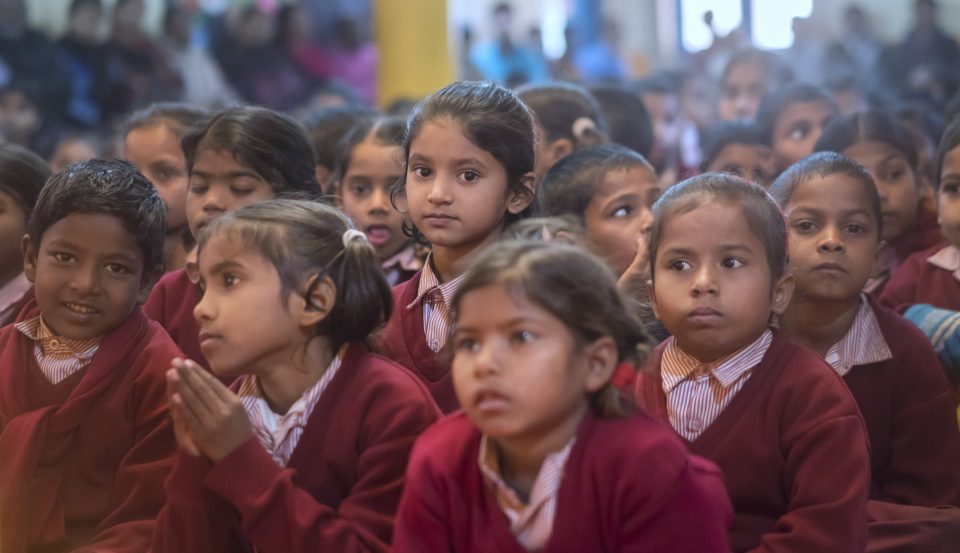
Students of Maitreya School, Bodhgaya, India.
Since 2012 the Social Services Fund has been supporting disadvantaged schools in Nepal and India that have students of Tibetan, Nepali, Sherpa, and Indian heritage. Approximately 1,000 children in orphanages, hostels, and Tibetan refugee communities benefit from this aid.
We invite you to rejoice in the ways we offered educational support to these children this year, thus helping break the cycle of poverty in impoverished areas and to help facilitate both a modern education and Dharma education for those in need.
Schools Supported in 2021
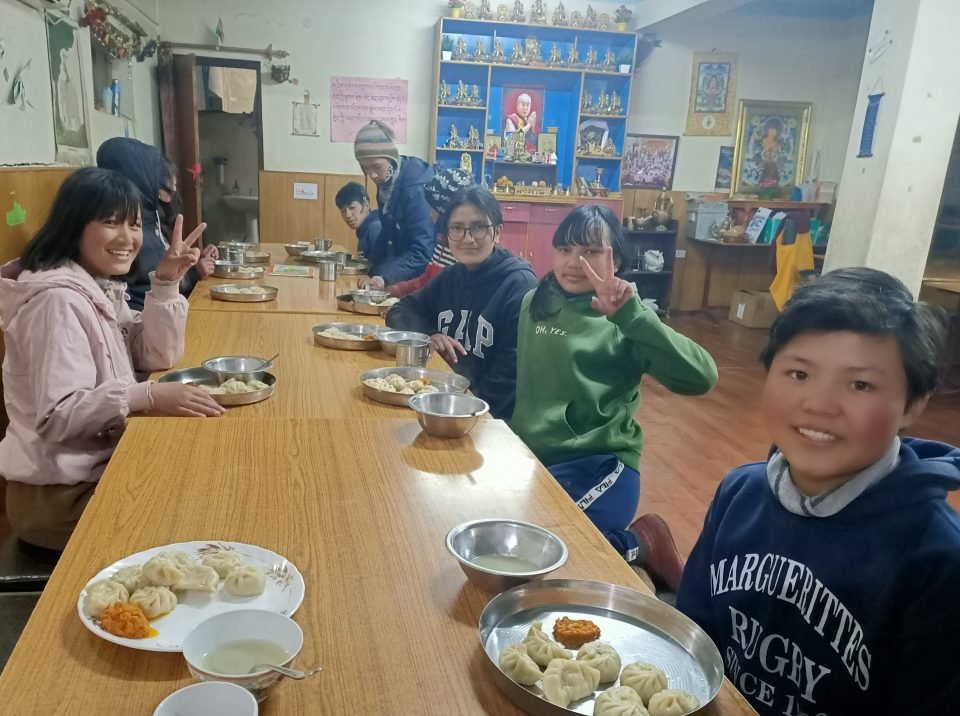
Students of Ngari Institute, Ladakh, enjoying a meal together.
Ngari Institute in Ladakh, India, helps disadvantaged children from remote regions of Ladakh and arranges to send them to, currently, three different schools. The Institute arranges all the costs related to offering this education, including the facility fees, food, uniforms, etc. The Social Services Fund has been covering all the costs of the food for the children and the teachers for eight years. This offering started in 2013 at US$15,720.62, and this year we were so happy to issue a grant for US$33,232.
Rolwaling Sangag Choling Monastery School, established in 2010, educates thirty-two children from poor families across the Dolakha District of Nepal at the primary school level and provides free boarding, medical attention, clothing ,and other needs to its students with the help of four teachers. A number of monks from the local monastery also attend this school. Many Kopan monks come from Rolwaling, so FPMT’s relationship with this school is quite special. It is a free school that also teaches Dharma. We were very happy to send a grant of US$19,187 for the operating costs of this school this year.
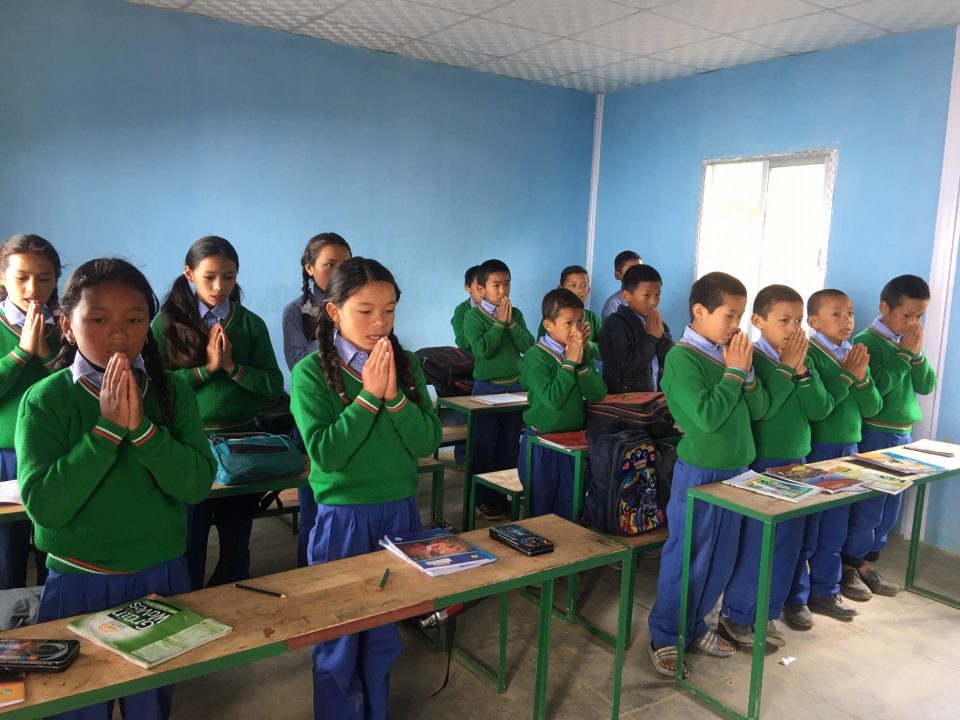
Some of the students of Sangag Dechholing Gonpa School, Taplejung, Nepal.
Sangag Dechholing Gonpa School in Taplejung, Nepal, was established in 2007 to serve the Buddhist community in the area. Seven teachers currently educate 105 students, starting at age three. The curriculum is taught by eleven staff in English and Nepali and focuses on modern subjects such as math and science, while being grounded in Buddhist teachings and culture. In 2021, US$29,908 was sent for operating expenses, which is the annual cost of this free school. Kopan Monastery is now taking over responsibility of this school and FPMT is helping to raise the annual costs through our Social Services Fund.
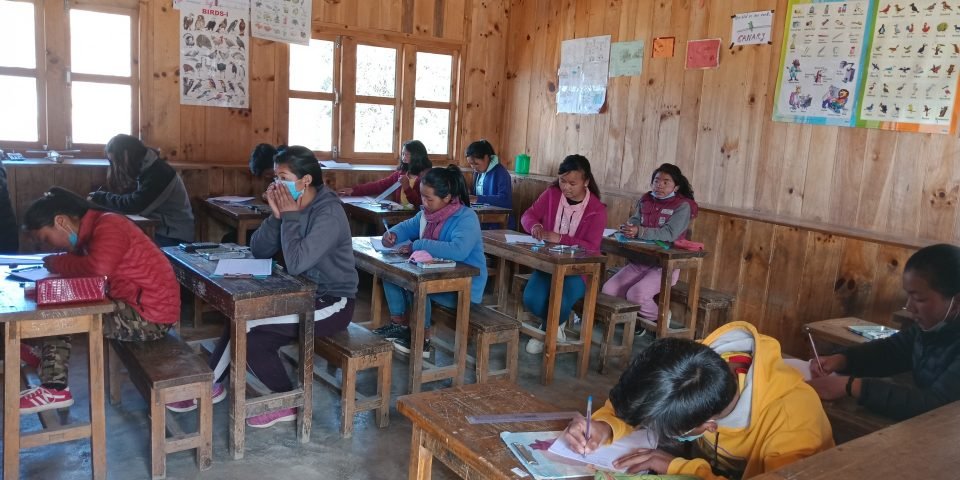
Students of Sagarmatha Secondary School in Chailsa, Nepal.
Sagarmatha Secondary School in Chailsa, Nepal, is located on what was once a Tibetan refugee camp. It currently serves 170 students, including 79 young lay students who live at the school hostel and 25 young monks who live at Thubten Shedrup Ling Monastery, which is a branch of Kopan Monastery and shares the school grounds. Eleven teachers and one additional employee support these students. Since 2015 we have offered annual grants to the school that covers the salaries of teachers in addition to yearly text books and one set of school uniforms per year for the students. We are very happy to continue this commitment with the very year kind help of Yeshe Norbu Association and Unione Buddhista Italiana (U.B.I.). The annual cost is US$30,000 and will be offered at the end of 2021.
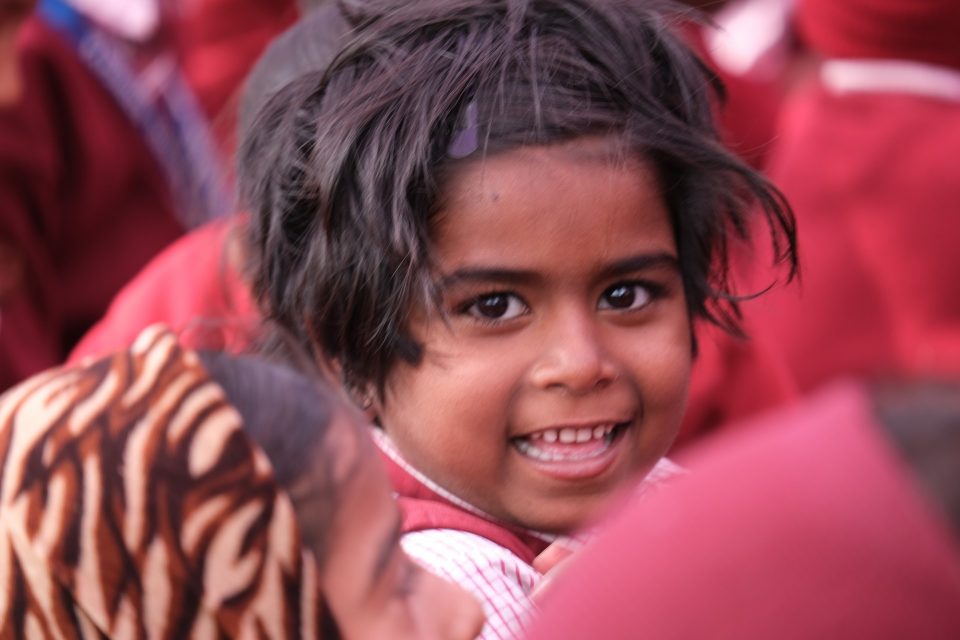
A young student of Maitreya School, Bodhgaya, India.
Maitreya School, which is a social service project of Root Institute, Bodhgaya, India, is a free school benefiting impoverished children from neighboring villages. The school offers children living in one of India’s poorest states a precious opportunity. Not only do they engage in a traditional education but, more importantly, they receive life skills in compassion, honesty, and loving-kindness presented through Buddha’s teachings. The core of the training and vision of the school is: making lives meaningful. The school has a total of 305 students. Since 2012 we have offered yearly support toward the operating costs as well as two new buses for transporting students. In 2021 we offered US$39,200 toward the annual costs of operating the school. The last year the school has been operating in various ways online.
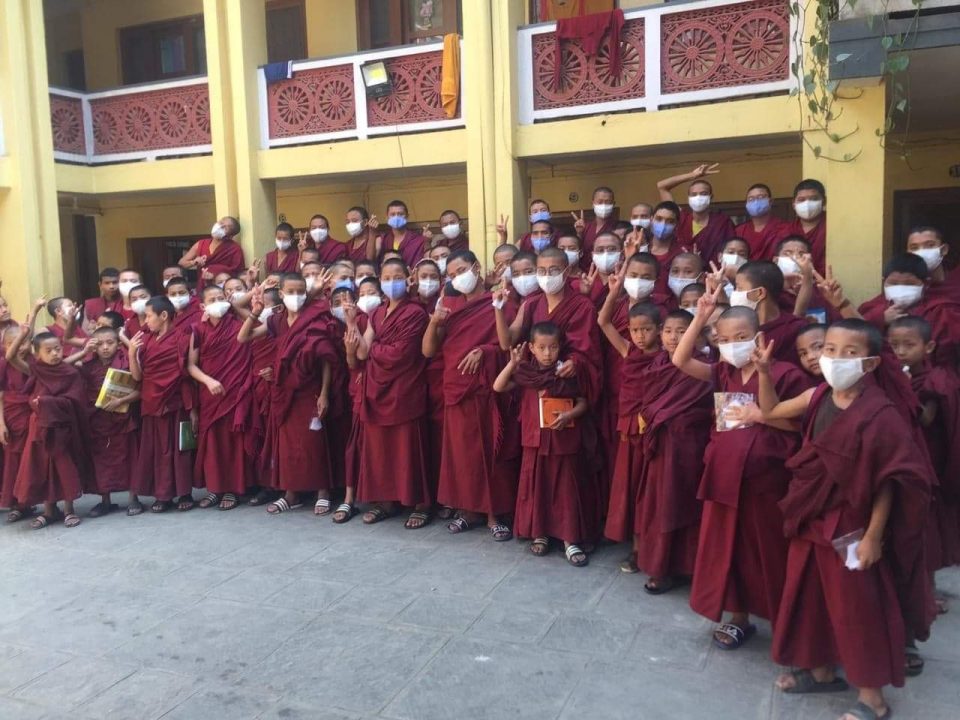
Students of Samtenling School, Khathmandu.
Samtenling Monastery provides the young monks of the monastery a modern, progressive, secular education in Kathmandu, Nepal. Out of 140 monks, 120 of them are aged 6-26. Samtenling School provides education from kindergarten through grade eight. Most of the monks are from Nepal and are primarily Sherpas and Tamangs, but Tibetan monks also attend the monastery and school. The school has been operating without proper facilities. To help with this need, we have been issuing a grant raised from Unione Buddhista Italiana (U.B.I.) in installments over the past two years to build new classrooms and debate courtyard.
In 2021 we offered US$40,402 toward Tashi Lhunpo Monastery in South India for their educational program, covering the salaries of all the teachers and staff, as well as textbooks, stationary, and other resources.
Please join us in rejoicing in another year of support offered to these beneficial schools due to the kindness of so many. Incredibly, US$161,930 was offered toward education this year. Thank you to all the kind donors, including Yeshe Norbu Association and Unione Buddhista Italiana (U.B.I.) who made it possible to offer this substantial support.
The Social Services Fund, established to support Lama Zopa Rinpoche’s Vast Visions for the FPMT organization, focuses efforts primarily in India, Nepal, Tibet and Mongolia. Funds help children, the elderly, sick, and very poor.
All are welcome to support the Social Services Fund and help ensure we can continue to offer support to the education of children in need.
- Tagged: maitreya school, ngari institute, ngari institute of buddhist dialectics, rolwaling sangag choling monastery school, sagarmatha secondary school, samtenling school, sangag dechholing gonpa school
20
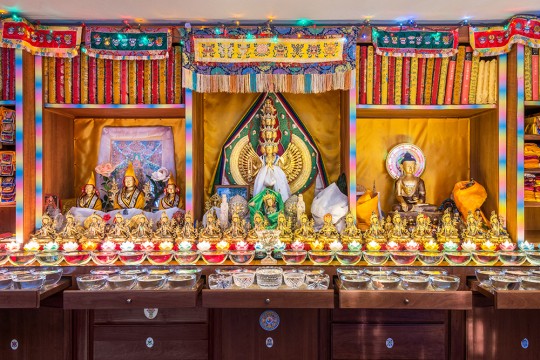
It takes Sangha many hours each day to offer water bowls as part of the extensive offerings at Kachoe Dechen Ling.
Since 1999, Lama Zopa Rinpoche has arranged to have continual extensive offerings of water bowls and lights offered twenty-four hours a day, 365 days a year to create merit for the FPMT organization. Since this began over two decades ago, these offerings have been increasing and are now happening in various parts of the world.
Lama Zopa Rinpoche has explained, “We are not aware of the limitless skies of benefits we achieve from the practice of offering, what we can achieve and enjoy from life to life. Even while you are in samsara, you enjoy good rebirths, wealth, and every happiness. Even just the samsaric perfections are amazing, without adding all those incredible realizations that allow us to offer deep benefit to sentient beings, liberating them from oceans of samsaric suffering and its cause, delusion and karma.”
Rinpoche personally incorporates all of these actual physically made offerings in his daily practices and when doing food offerings he sometimes leads an extensive practice where all of the offerings are visualized and multiplied and then mentally offered to Buddha, Dharma, Sangha and all the holy objects around the world.
Rinpoche advises students, whenever making offerings in our practice, that we can also remember all the other arranged offerings in Kachoe Dechen Ling, CA, US; Buddha Amitabha Pure Land, WA, US; and also in all the FPMT centers around the world, by using these actual offerings as a basis and then visualizing and multiplying them. In this way, we can join in the merit from those having made these extensive offerings every day.
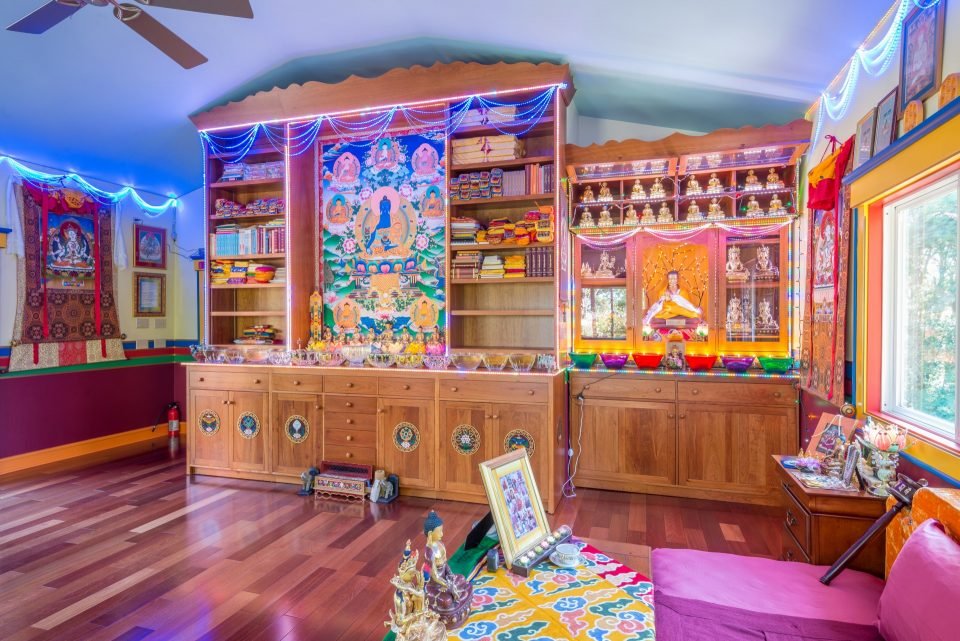
Extensive offerings at Kachoe Dechen Ling, CA, US.
Please Rejoice in Some of the Extensive Offerings Around the World
- Thousands of light offerings, hundreds of water bowls, and a garden full of flower offerings at Kachoe Dechen Ling, CA, US.
- Thousands of light offerings, hundreds of water bowls, and a garden full of flower offerings at Buddha Amitabha Pure Land, WA, US.
- Thousands of light offerings, hundreds of water bowls, and gardens full of flowers offerings at Root Institute, Bodhgaya, India.
- Thousands of lights, hundreds of water bowls and gardens full of flower offering at Kopan Monastery, Nepal.
- 100,000 lights continually offered at Amitabha Buddhist Centre (ABC), Singapore.
- 100,001 lights continually offered at Chokyi Gyaltsen Center, Malaysia.
- Thousands of water bowl offerings, extensive light offerings at Ganden Do Ngag Shedrub Ling Center, Mongolia. These offerings are made daily by a group of very dedicated elderly volunteers.
- Continually burning butter lamp in front of precious stupa with Trulshik Rinpoche’s holy body in Chailsa, Nepal.
- Continually burning butter lamp in front of Guru Lhakang, Thubten Choeling, Chailsa, Nepal
Please rejoice and remember all these extensive offerings that happen every moment of every day!
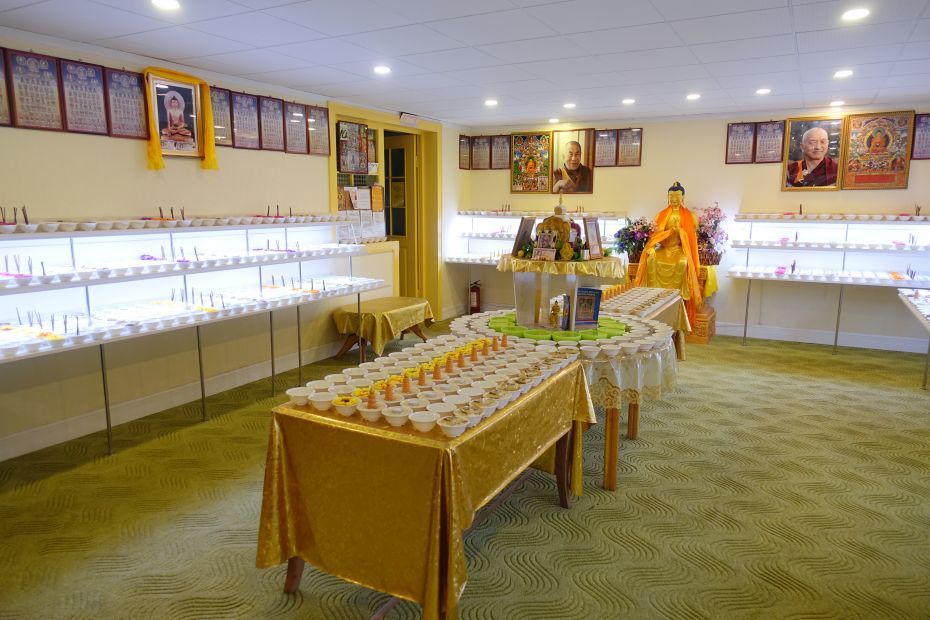
Water bowls and extensive offerings at Ganden Do Ngag Shedrub Ling Center, Mongolia, offered by a dedicated group of elderly volunteers.
The Actual Offering Prayer
The actual offering prayer is recited five times, ten times, one thousand times, or however many times you want to make offerings.
These clouds of (light) offerings, both actually arranged and mentally emanated, filling space,
Are manifestations of my own innate awareness, the dharmakāya.
These clouds of offerings equaling the sky,
I offer to all the gurus, the Three Rare Sublime Ones,
And all the statues, stūpas, and scriptures, which are manifestations of my guru.
By the merits of generating bodhicitta, making charity to the numberless sentient beings, and making these (light) offerings to the gurus, the Three Rare Sublime Ones, and all the holy objects in the ten directions—
For all those sentient beings who rely upon me,
All those for whom I have promised to pray,
All those whose names have been given to me,
And, principally, those who have a connection with me, my servants, benefactors, and disciples
As well as all remaining transmigratory beings, both living and dead—
May the rays of the lights of the five wisdoms completely purify
all their degenerated vows and samayas right now!
May all the sufferings of the evil-gone realms cease right now!
May the three realms of saṃsāra be emptied right now!
May all impure minds and obscurations be purified right now!
May all impure appearances be purified right now!
May the five holy bodies and wisdoms spontaneously arise!
—From Extensive Offering Practice: A Practice to Accumulate the Most Extensive Merit with Light and Other Offerings by Lama Zopa Rinpoche
Through the Lama Zopa Rinpoche Bodhichitta Fund Rinpoche supports a number of Sangha to make many of these offerings daily, as well as covering the cost of electricity for the extensive light offerings at Kachoe Dechen Ling, Buddha Amitabha Pure Land, Kopan Monastery in 2021, and Root Institute, as well as the butter for the continual light offerings in Nepal and also occasionally the meals to the kind volunteers of Ganden Do Ngag Shedrub Ling Center, Mongolia.
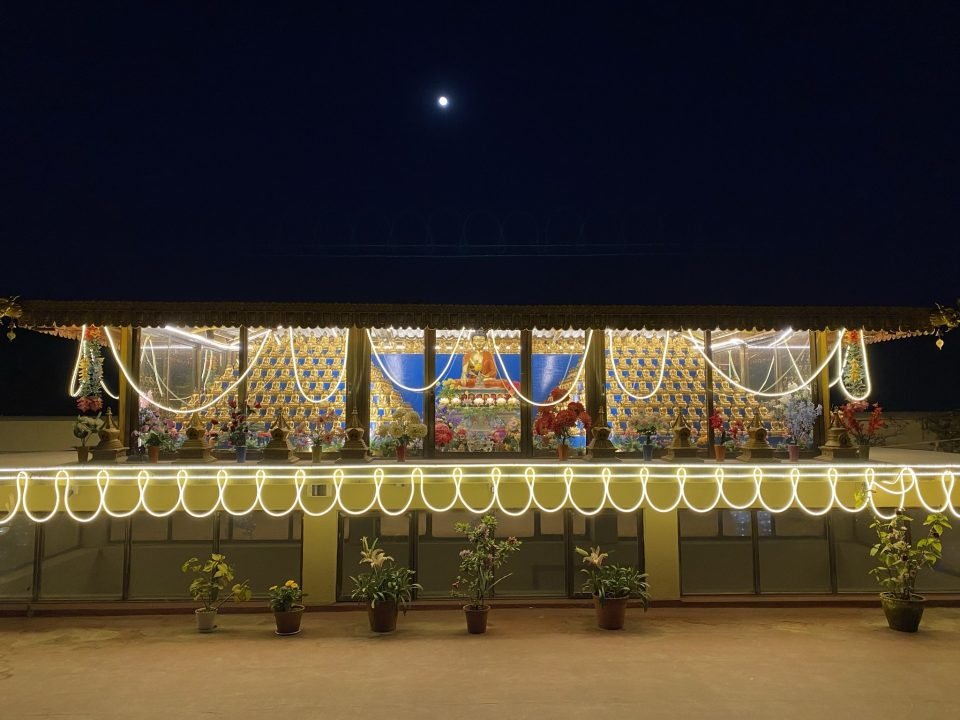
Extensive offerings at Kopan Monastery, Nepal.
You can learn more about the many beneficial activities of the Lama Zopa Rinpoche Bodhichitta Fund or other Charitable Projects of FPMT.
13
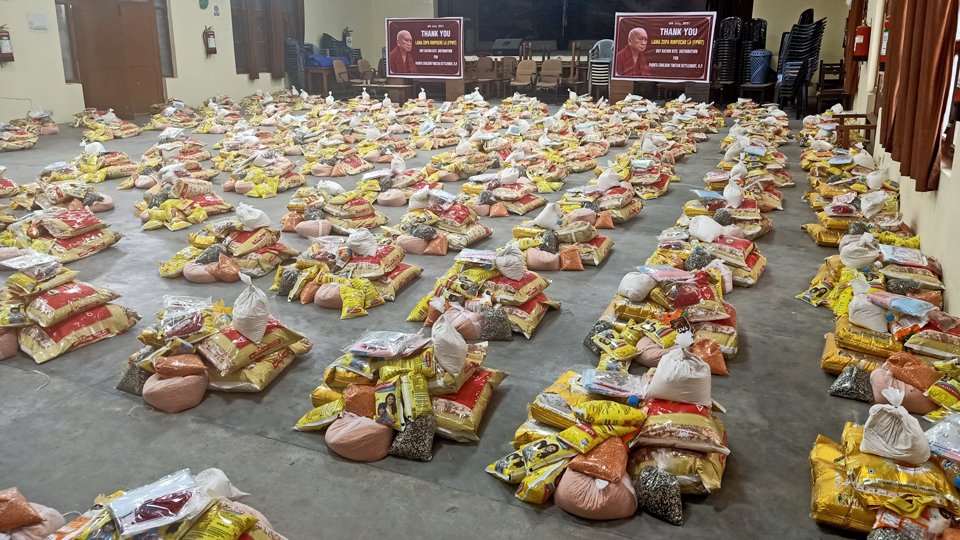
Food ready for distribution, Paonta Cholsum Tibetan Settlement, Himachal Pradesh, India, July 2021. Photo courtesy of Paonta Cholsum Tibetan Settlement.
The COVID-19 pandemic has created hardship around the world. Paonta Cholsum Tibetan Settlement, located in Paonta Sahib Himachal Pradesh, India, has lost a significant source of income due to lockdown restrictions. The settlement recently reached out to Lama Zopa Rinpoche for assistance with food.
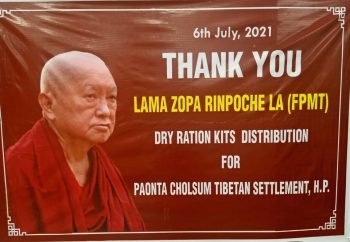
Banner at food distribution site, Paonta Cholsum Tibetan Settlement, Himachal Pradesh, India, July 2021. Photo courtesy of Paonta Cholsum Tibetan Settlement.
On the occasion of His Holiness the Dalai Lama’s 86th Birthday, Mr Gelek Jamyang, the settlement officer, wanted to make an auspicious offering to help 125 families with food. Lama Zopa Rinpoche was extremely happy to be able to offer support in this way and through FPMT Social Services Fund. The food offered to the 125 families included essential staples of rice, atta (wheat flour), cooking oil, dal, and eggs.
According to the settlement officer, ninety percent of the settlers earn their livelihood through winter sweater sales in different states of India. Due to COVID-19 restrictions, winter sweater sales have not happened for two years. The settlement relies on the sales income to support their daily expenses.
Please rejoice that we were able to join in this offering made on the occasion of His Holiness the Dalai Lama’s birthday.
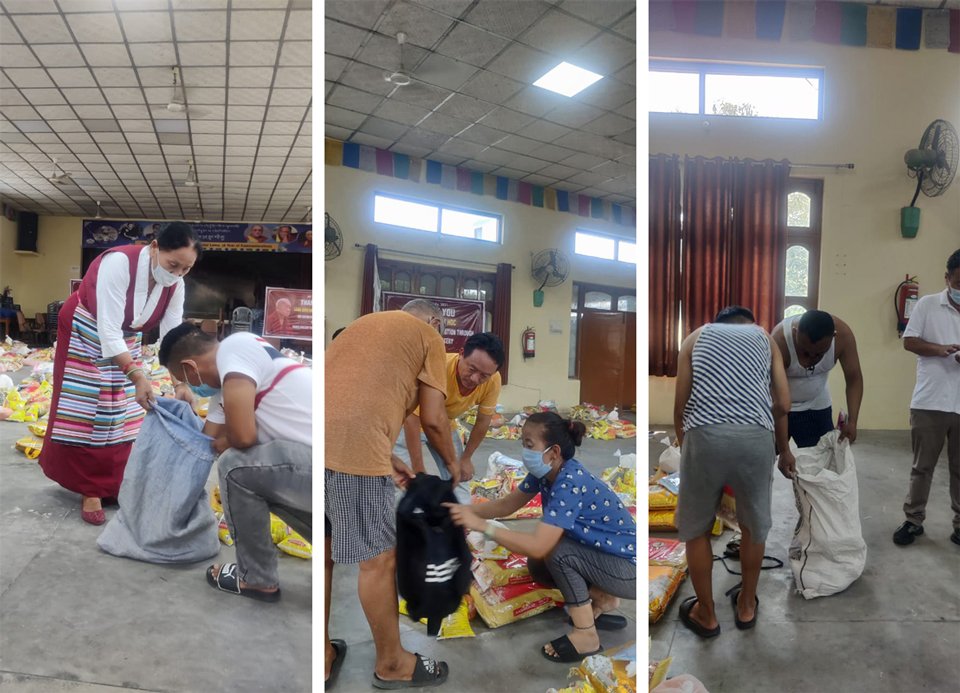
Images of the food distribution on His Holiness the Dalai Lama’s birthday, Paonta Cholsum Tibetan Settlement, Himachal Pradesh, India, July 2021. Photo courtesy of Paonta Cholsum Tibetan Settlement.
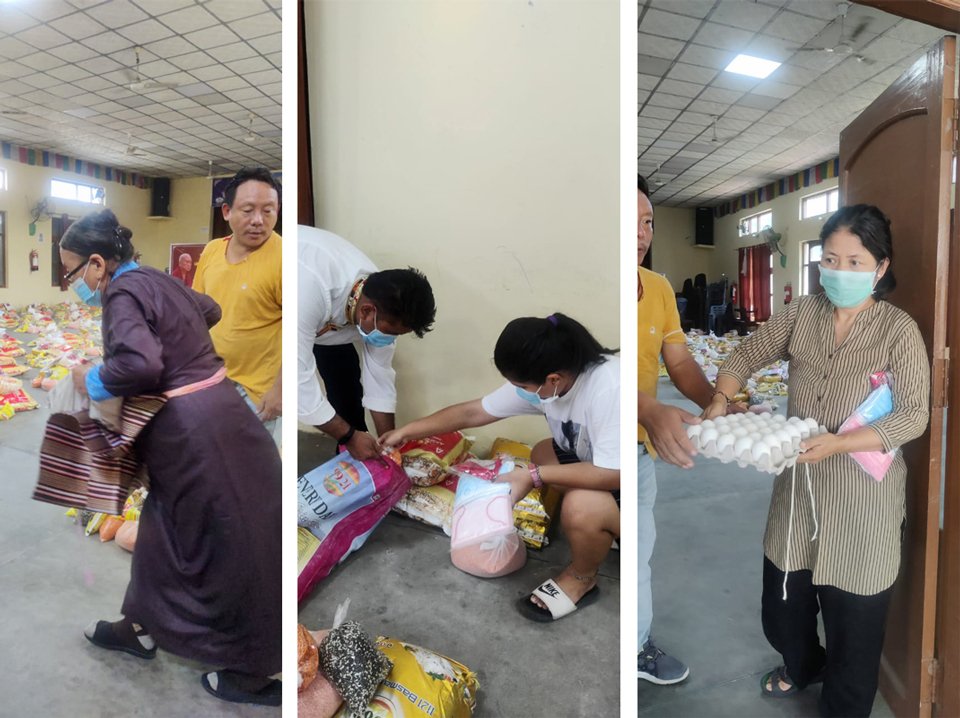
Images of the food distribution on His Holiness the Dalai Lama’s birthday, Paonta Cholsum Tibetan Settlement, Himachal Pradesh, India, July 2021. Photo courtesy of Paonta Cholsum Tibetan Settlement.
All are welcome to support the Social Services Fund and help ensure we can offer direct support to Tibetan refugees in need.
7
Support to Seven Elderly Homes Serving Tibetan Elders in 2021
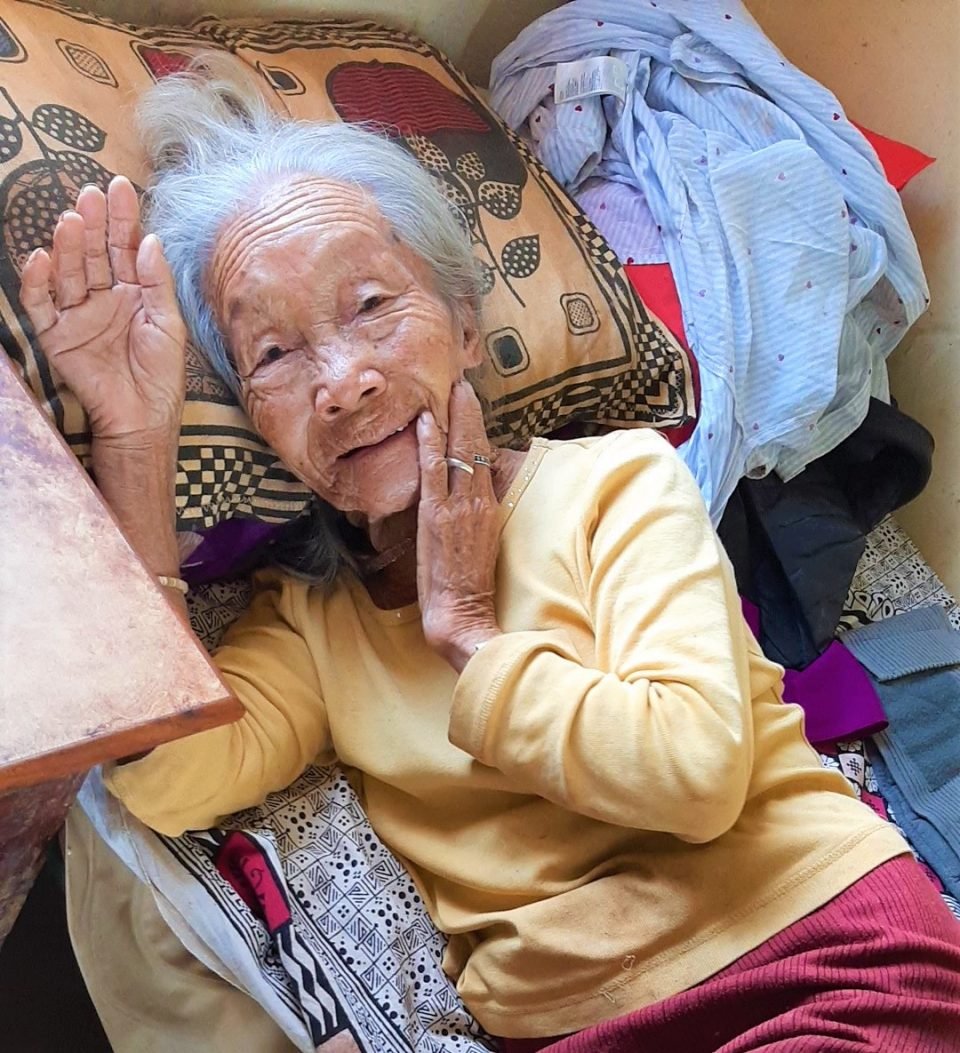
An elder of Dhondenling Old People Home, Kollegal.
Since 2015, the FPMT Social Services Fund has been offering support to hundreds of Tibetan elders residing in elderly homes throughout India. Tibetans have been living in exile since 1959 when Communist China invaded Tibet, forcing 100,000 Tibetans to flee to India, Nepal, Bhutan and eventually elsewhere around the world. Many of the Tibetan refugees in India and Nepal are now elderly and many are rendered destitute and in desperate need of care at this critical phase of life. Tibetan families traditionally provide for the elderly and sick among them. However, when a family itself is in deep poverty, or if the elderly individual is alone and without family support, help is needed.
Lama Zopa Rinpoche has encouraged us to not only address residents’ material needs such as food and shelter, but also their spiritual ones. With this in mind, we’ve also sponsored holy objects such as stupas and prayer wheels on the premises of some of these homes as well, encouraged the recitation of sutras and mantras, and provided grants to ensure the elders have adequate and appropriate space for Dharma practice and merit-making group activities.
In 2021 we sent US$286,887.28 to support seven elderly homes in India. Please join us in rejoicing that these grants were used in the following ways:
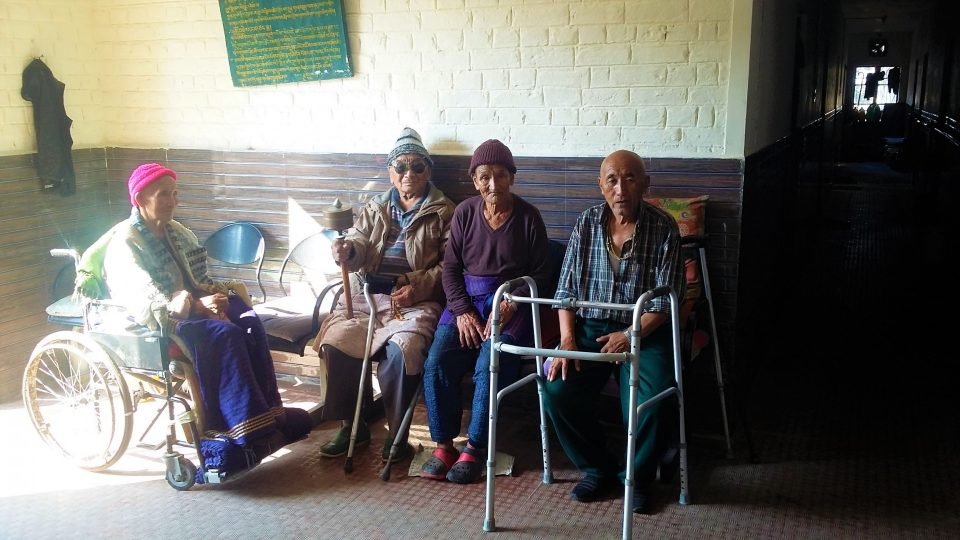
Elders of Jampaling Elder’s Home, Dharamsala.
Elderly Homes Supported in 2021
Jampaling Elder’s Home, Dharamsala, provides food, shelter and medical services to 156 residents. US$13,914 was offered for shortfall of their 2021 operating budget.
Lugsam Samduling Home for the Aged and Disabled, Bylakuppe, looks after 46 elderly individuals who are living in extremely modest conditions, many with health issues due to the advanced age. US$39,354.65 total was offered to this home to cover budget shortfall for 2021 and for an ambulance for the settlement’s hospital, Tsojhe Khangsar Hospital. This ambulance will be used by the people of two Tibetan Settlements and there are around 20,000 people, including Himalayan monks and nuns, residing in the various monasteries.
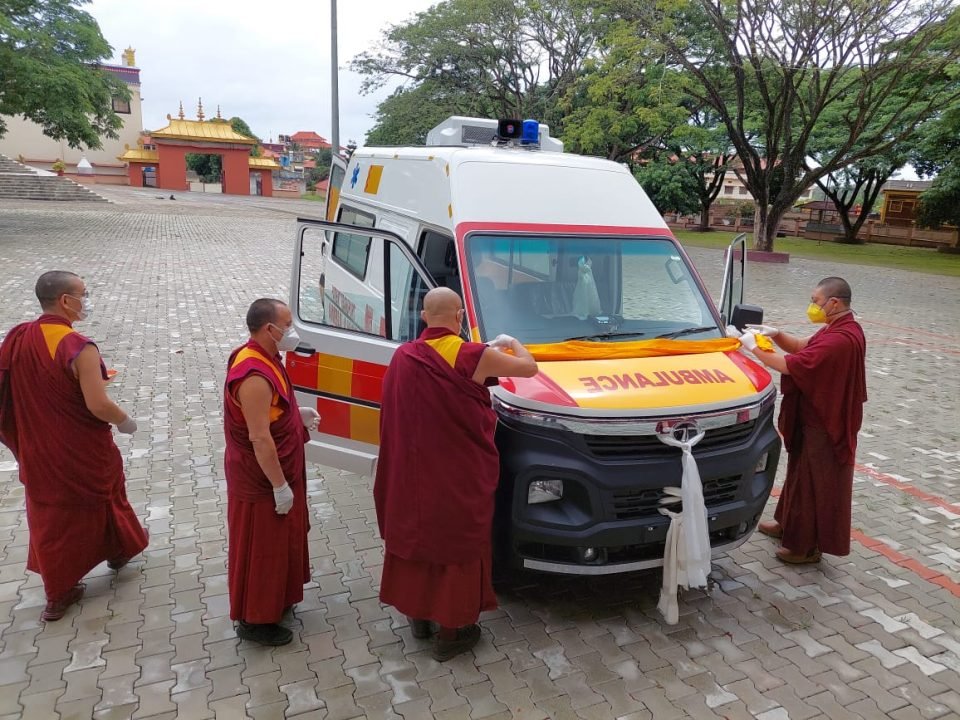
Sera Je monks consecrating new ambulance sponsored for Tsojhe Khangsar Hospital.
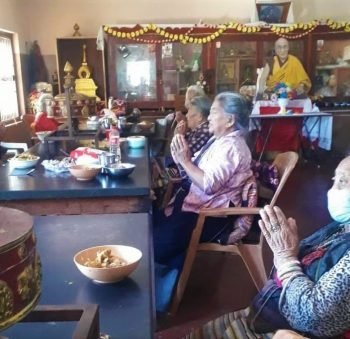
Elders of Dhondenling having morning prayer before breakfast.
Doeguling Home for Elderly and Disabled, located in the Doeguling Tibetan Refugee Settlement in Mundgod, cares for 103 elderly residents. US$41,745 was offered for food, medical expenses, and an investment into the corpus fund which contributes to the sustainability of the home.
Dhondenling Old People Home, Kollegal, is in one of the most remote and underdeveloped Tibetan settlements in southern India. The elderly home has a capacity for 32 elderly Tibetans residents. US$28,314.63 was offered to cover 70% of their annual operating budget and a separate grant from Buddha Union of Italy of US$48,628.87 was offered for the final costs of community hall that is being built.
Rabgayling Tibetan Family Welfare Association, Hunsur, has an elderly home serving 20 residents. US$25,813.33 was offered this year for their medical fund and recurring expenses.
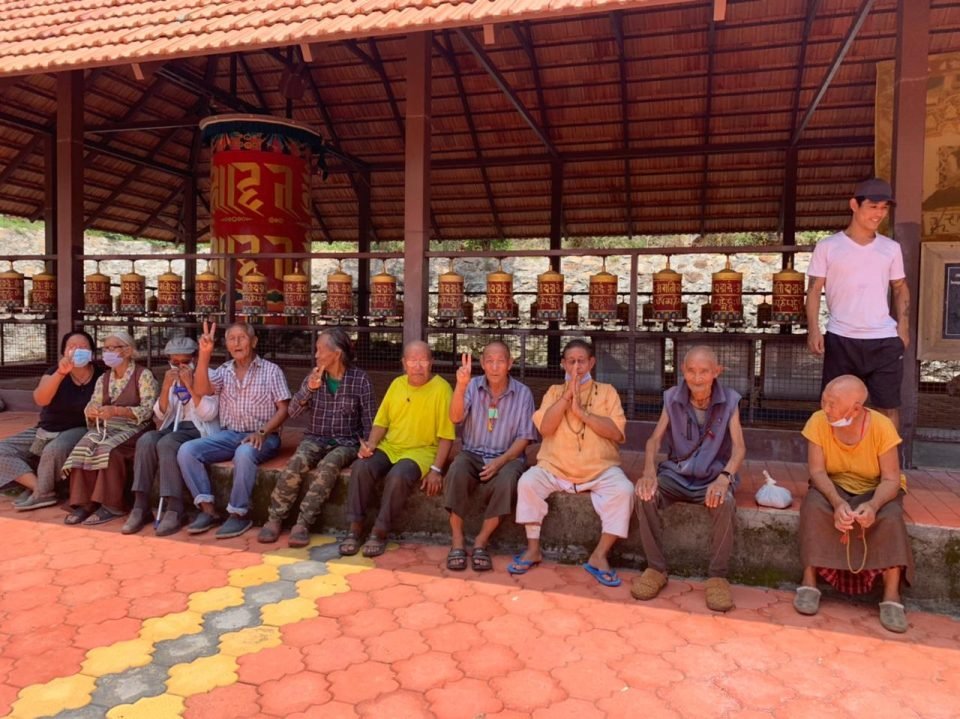
Elders of Rabgayling Tibetan Family Welfare Association home in front of prayer wheels.
Chauntra Dhonden Old People’s Home, Bir. US$69,570 was offered this year for installation of new metal roofing sheets and repair and maintenance. This home home cares for 24 elders and the support was requested on behalf of the Tibetan government and this was our first year supporting this home.
Old People’s Home Odisha Phuntsokling Settlement, Orissa, is a home caring for 19 Tibetan elders. There are also five monasteries on this settlement as well as two primary schools, one middle school, and a nursery for babies. US$19,546.80 was offered for their annual budget which they desperately needed after losing their main sponsor of ten years. This is our first year supporting this home.
The Social Services Fund also provides charitable giving to children, the sick, and the very poor through a variety of grants every year.
Thank you to all the donors who make this most urgent and critical support for Tibetan elders possible.
All are welcome to support the Social Services Fund and help ensure we can offer direct support to the elderly.
22
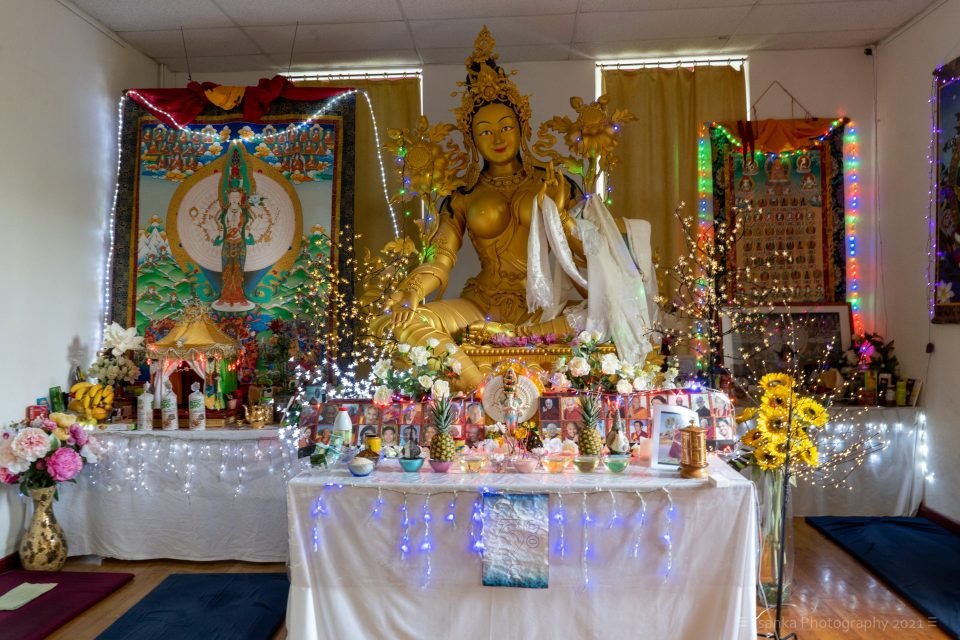
Beautiful Nyung-na altar at Institut Vajra Yogini, France.
By Nicolas Brun
One of Lama Zopa Rinpoche’s Vast Visions for the FPMT organization is to sponsor 1,000 Nyung-Na Retreats. In response to Rinpoche’s vision, Institut Vajra Yogini (IVY) has been hosting the TENTH 108 Nyung-Na Retreat and has now started to plan the eleventh set of 108 nyung-nas, from November 12, 2021 to mid-June 2022.
This year, following the COVID-19 crisis, the center had to face a really big challenge as the Nyung-Na Retreat was becoming more attractive for people. Before the pandemic, sessions could attract 20-25 people as one had the possibility to come and practice for a session. Unfortunately, the external conditions forced us to announce the end of this possibility because of the safety measures decided by the government.
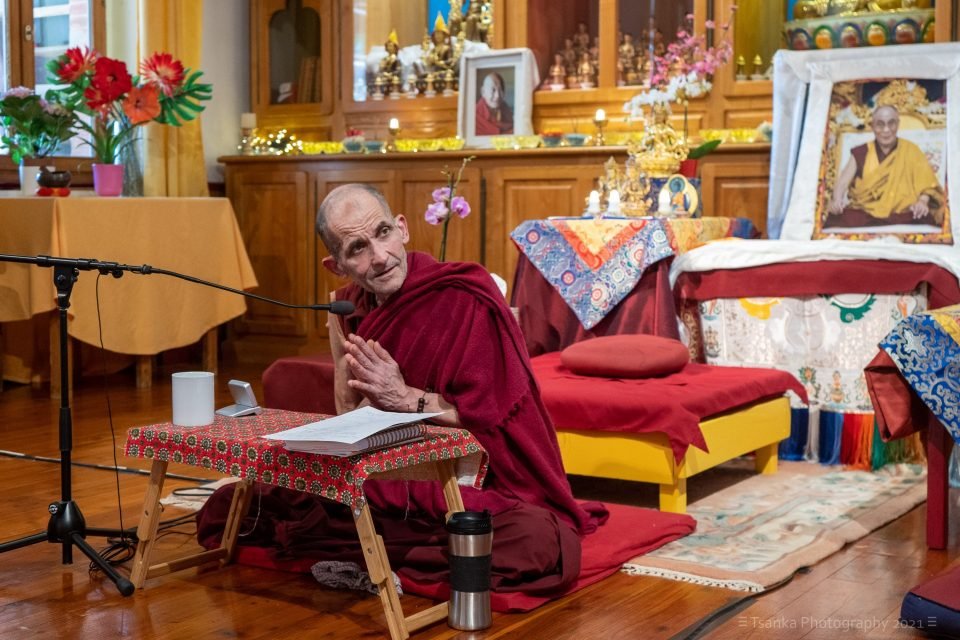
Ven. Charles leading tenth 108 Nyung-na Retreat at Institut Vajra Yogini.
Because it was impossible to us the completely stop the retreat, all the team decided to keep some of the retreatants in a safe place and include them in the lockdown organization of IVY. Five long-term nyung-na retreatants have been able to stay and keep going three sessions a day, dedicating their practice for all of us and for all beings. We’ve also requested this year Ven. Charles allow us to broadcast some sessions online so that every morning people could join the first session, and do one complete nyung-na every month at a distance.
The Nyung-Na Retreat is an intensive practice that carries great blessings and is highly praised by Lama Zopa Rinpoche as a supreme method for transforming the mind. The practice includes taking the 24-hour Mahayana precepts every day, with the addition of complete fasting and silence every second day. One does four 2.5 hour sessions of well-structured practice that includes meditation, prostrations, and mantra recitation each day. It is a powerfully effective experiential practice that can be done by anyone with respect and faith for the practice.
These nyung-nas will be led in French but people can follow simultaneously in English or other languages.
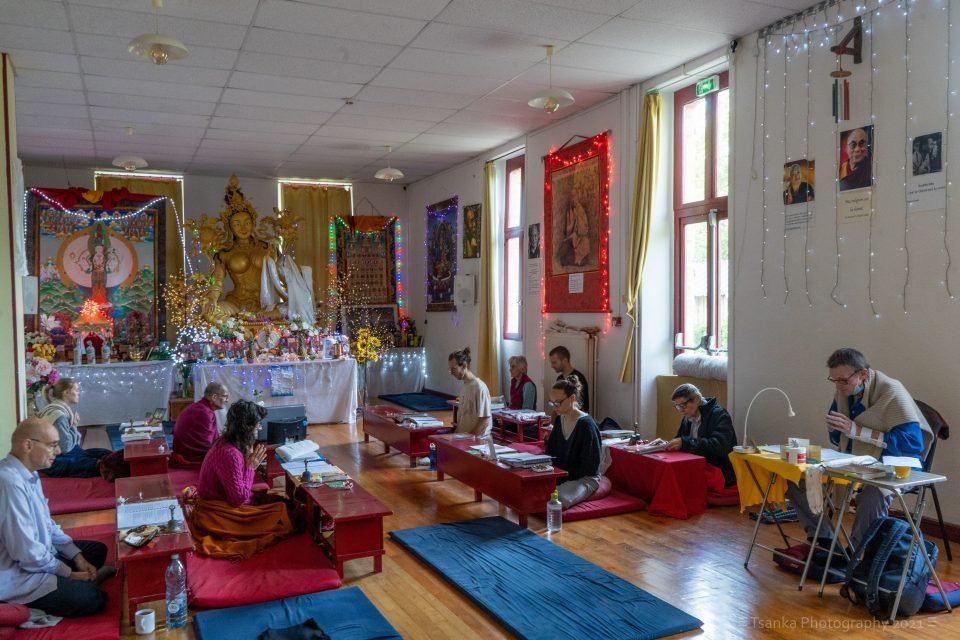
2021 participants in the 108 Nyung-na retreat at Institut Vajra Yogini.
Everybody is welcome to join for one or more nyung-nas. You can contact Institute Vajra Yogini to enter any number of these retreats (1-100) when they begin the next set. Contributing to the sponsorship of these retreats or completing one or more yourself is directly contributing to Rinpoche’s wishes.
Nicolas Brun is the Director of Institut Vajra Yogini, France.
A Practice to Open the Heart
As always, participants were moved by this challenging and sincere practice of nyung-na at Institut Vajra Yogini. One retreatant commented, “[Nyung-Na] requires a lot of commitment, discipline, and acceptance of suffering, but for this reason it also allows you to work on several levels.” Another reflected, “It is very special to go on this insightful and heart-opening journey to the many different corners of one’s mind, while being in a space full of kindness and care and with beloved Ven. Charles as a guide and example, who has the capacity to touch the hearts of every participant like a loving mother taking care of all her children equally.” One grateful participant gratefully shared, “Finally a retreat that has meaning for me! I really feel my heart opening for sentient beings.”
“Nyung-Nas are a most powerful, most beneficial and quickest way for you to develop bodhicitta, to collect extensive merit to quickly achieve enlightenment, to become Chenrezig, to liberate sentient beings from the oceans of samsara suffering and bring to enlightenment….This is an extremely powerful practice, it in an incredible way to develop bodhichitta.” —Lama Zopa Rinpoche
Lama Zopa Rinpoche, through the Lama Zopa Rinpoche Bodhichitta Fund. has been sponsoring the food and accommodation for up to ten people, each year, who undertake this retreat, and for the tenth 108 Nyung-Na Retreat at IVY US$7,315.38 was offered for the first half of the retreat. The next set of 108 nyung-nas is scheduled to begin on November 12, 2021. Lama Zopa Rinpoche is again offering sponsorship for up to ten people to commit to 100 nyung-nas.
You can learn more about the Lama Zopa Rinpoche Bodhichitta Fund as well as the other Charitable Projects of FPMT.
- Home
- News/Media
- Study & Practice
- About FPMT Education Services
- Latest News
- Programs
- New to Buddhism?
- Buddhist Mind Science: Activating Your Potential
- Heart Advice for Death and Dying
- Discovering Buddhism
- Living in the Path
- Exploring Buddhism
- FPMT Basic Program
- FPMT Masters Program
- FPMT In-Depth Meditation Training
- Maitripa College
- Lotsawa Rinchen Zangpo Translator Program
- Universal Education for Compassion & Wisdom
- Online Learning Center
- Prayers & Practice Materials
- Overview of Prayers & Practices
- Full Catalogue of Prayers & Practice Materials
- Explore Popular Topics
- Benefiting Animals
- Chenrezig Resources
- Death & Dying Resources
- Lama Chopa (Guru Puja)
- Lama Zopa Rinpoche: Compendium of Precious Instructions
- Lama Zopa Rinpoche: Life Practice Advice
- Lama Zopa Rinpoche Practice Series
- Lamrim Resources
- Mantras
- Prayer Book Updates
- Purification Practices
- Sutras
- Thought Transformation (Lojong)
- Audio Materials
- Dharma Dates – Tibetan Calendar
- Translation Services
- Publishing Services
- Teachings and Advice
- Find Teachings and Advice
- Lama Zopa Rinpoche Advice Page
- Lama Zopa Rinpoche: Compendium of Precious Instructions
- Lama Zopa Rinpoche Video Teachings
- ༧སྐྱབས་རྗེ་བཟོད་པ་རིན་པོ་ཆེ་མཆོག་ནས་སྩལ་བའི་བཀའ་སློབ་བརྙན་འཕྲིན།
- Podcasts
- Lama Yeshe Wisdom Archive
- Buddhism FAQ
- Dharma for Young People
- Resources on Holy Objects
- Ways to Offer Support
- Centers
- Affiliates Area
- Teachers
- Projects
- Charitable Projects
- Make a Donation
- Applying for Grants
- News about Projects
- Other Projects within FPMT
- Support International Office
- Projects Photo Galleries
- Give Where Most Needed
- FPMT
- Shop
Translate*
*powered by Google TranslateTranslation of pages on fpmt.org is performed by Google Translate, a third party service which FPMT has no control over. The service provides automated computer translations that are only an approximation of the websites' original content. The translations should not be considered exact and only used as a rough guide.Every second of this human life is more precious than skies of wish-granting jewels.







